#like there are real people behind all this who just chose to exploit a grieving man like that
Text
honestly what annoys me So Much about the way the media treated Paul following Johns death (with the sensationalisation around the "its a drag" comment) is that its like, entirely fake, y'know? like these media corporations weren't sitting there, genuinely offended about what Paul had said, they just saw a good headline and said Yes Lets Exploit That For $$$. the amount of pain Paul must have been in already over johns death and the way that exploitation must have exasperated all those feelings. i hate them
#1 am thoughts#fr its just so evil#like there are real people behind all this who just chose to exploit a grieving man like that#WHY#can you even imagine being that person [the person who said Yeah Lets Make THAT Our Headline]#just the lack of empathy you have to have to be That Person#(or like -- any person involved in constructing that story and giving it the Green Light)#cause like. at least if they had Genuinely Believed that Paul was completely callous and indifferent towards johns death then like#it would still suck but at least that outrage would be from a sincere place of misunderstanding. BUT THERES NO WAY THEY BELIEVED THAT#im aware im literally saying nothing new here#it just frustrates me and I wanted to share
16 notes
·
View notes
Text
SOMETHING MORE (the mandalorian x reader)
CHAPTER 26: Prove It
RATING: Explicit (18+ ONLY!!!)
WARNINGS: violence
SUMMARY: “Nova!” Din cries again, and you squint and try to push yourself up and out of the dirt, but you’re wounded and you’re so damn tired. You mean to just take a beat and then hurl yourself up off the ground again, but you get stormed with another hit, and you realize they’ve hit you with tranquilizers again, and it just seems so much easier to surrender. Whoever they’re working for, whoever’s after you, they can take this win as long as you get to fall into this sleep on the way there. Hazily, feeling deprived of your oxygen, you think about Din, and you weakly look up for him, where he’s fighting off the rest of the battalion that wants to spill both of your blood all over Takodana’s ground.
“Run,” you manage, weakly, eyes focusing and unfocusing on the beskar like a laser beam.
His face, still helmeted, still covered, is in front of yours, crystallized, just for a second, but it’s enough. “There’s not a fucking chance,” he says, voice convicted through the modulator, “that I am ever leaving you again.”
AUTHOR'S NOTE: HELLO MY LOVES AND HAPPY SOMETHING MORE SATURDAY!!! this chapter is...so much. such a wild ride. such a rollercoaster. it's 10k+ words, and almost all of it was written in a single sitting because it just would not stop coming out. my fellow happiness and fluff lovers, we are finally (close) to the other side! with that, i'll stop spoiling the chapter until you can read ;) more notes, as always, at the end!!!
*
You kiss him. For what feels like hours, you kiss him. He doesn’t push you more than is tongue parting your lips, the hungry way that he sinks up against you, apologetic and raw. Din knows that you’re in control. You know you’re in control. Everything has been flipped on its head, and you hate it, you hate it, you don’t want to wield power over anyone, let alone the man you love, even if he has broken your heart clean through, so when you pull away, he doesn’t follow you.
“I don’t forgive you,” you whisper again, through the silence. He sighs, but not with exasperation.
“I know.”
“I don’t know if I ever will.”
Din’s quiet. You open your eyes, just a flutter of your eyelashes, really, and when you look at him, he’s not staring at you. He’s on his knees, eyes closed, mouth slightly parted, like he’s asking for repentance. Or praying. Or begging, but he’s so silent in his grief it startles you. “If you don’t,” he whispers, finally, “I understand. But please don’t—”
“Leave you?” you interrupt. It’s not nearly as bitter as you thought it would be. “Don’t worry,” you continue, quieter, “that’s not my move.”
He winces. “Nova—”
“I’m not trying to be cruel,” you say, earnestly, “really, I’m not, but y—you need to know how much it hurt me. You broke my trust. You gave me family again, a real family, and then you just took it away. I know you thought you were doing the right thing. I know you didn’t mean to hurt me. But it doesn’t matter, because you did.”
“I know,” Din manages, his eyes opening slowly and catching on yours. “I know, and I think I’ll be sorry about that forever. But I’m going to spend the rest of my life trying to make it up to you, I mean that.”
Because he’s so genuine about it, so honest, it makes you want to get mad and challenge him. But there’s a peace to his penance, his atonement, and it just makes you stare.
“Even if I leave you somewhere,” you say, “you’ll follow me. Right?”
His gaze is complicated. “Yes,” he says, finally. “I’m not letting you get hurt again because of a mistake I made.”
“Din,” you start, and he holds up a gloved hand. You’re so tired. Sotired. You don’t want to fight anymore. It’s exhausting. Trying to grieve and stay angry and constantly be on the run—it’s killing you. Your shoulders ache. The scar carved in your stomach hurts late at night, and even though it’s probably phantom pain—hurting because everywhere else hurts too—that added jaggedness makes it almost unbearable. So you just let it go with the air out of your mouth, just staring at him.
“I’m tied to you,” he repeats.
“You keep saying that,” you enunciate. “What do you mean?”
“Mandalorians choose their families,” Din mutters, “I chose you. That doesn’t go away—that feeling, that tie—even in death.”
“Does it go away when you leave your fiancé in the same place that you started your life with her?” you ask, but it’s tiredly, with no daggers.
Din stares at you. There’s something hidden behind his eyes, something hungry and forlorn and deep and yours. “Not for me,” he says finally, and his gaze lingers on you for just a little too long.
But before anything, you’re saved by the bell again.
“Rebel girl,” a familiar voice floats through the comm, “come in whenever you’re ready.”
You breathe, for what feels like the first time in years, a sigh of relief. “Wedge,” you manage, slinging the helmet back on to talk to him semi-privately. “You have no idea how good it is to hear your voice—”
“I’ve been trying for days,” he says, and you sink back into the pilot’s seat. “Your frequency was jammed up.”
“Ran into a few Empire ships,” you say, glancing at Din, who’s standing there, half in the shadows, trying to make sense of who you’re talking to. “I got sick of them trying to radio me. Plus, I didn’t want to call you first and send any more your way. How’s the base?”
“She’s shot,” Wedge admits, voice tinny, presumably from turning away to inspect the wreckage of the structure on Hoth, “but she’s standing. No fatalities. They were more interested in you than they were with us, so they just volleyed over a bunch of blasts and then went into warp. No one was seriously hurt,” Wedge repeats, “so let out that breath you’re holding.”
You do. “I’m so glad you’re all okay,” you breathe. “Um, Wedge?” You pause, looking over at Din for a fraction of a second before you barrel on, “did—did you hear from Luke again at all?”
Wedge sighs. “No,” he says quietly. “I’m afraid, honestly. I know Luke can hold his own against a lot worse than Moff Gideon, but—”
“He’s alive, and fine,” you cut him off, all in one breath. “I didn’t see him, uh, but my fiancé did.” At this, Din turns toward you. Just slightly, almost imperceptible, but you notice. “He took my kid. Grogu. Luke took him off to teach him, I think, protect him.”
“Thank the Maker,” Wedge says. It sounds sarcastic, coming out of his mouth, but you know he’s being serious. “And you? Were you able to find your family?”
Din can’t hear the other end of your conversation, not after you put the helmet back on. “Yes,” you breathe, finally, “yeah, I did.”
“I hope you know,” Wedge says, sighing, and there’s that fatherly edge in his voice again, “that if you’re ever in a tight spot, or a bad situation, or, you know, facing up against the dregs of the Empire, I want you to call me. We’re here to help you. And I owe you a favor.”
“Well,” you say, chancing another look over at Din, who is pretending to be preoccupied with the space outside, but he keeps sneaking glances over at you, “I could cash that favor in now, if you’re willing. Do you know where the safest place in the galaxy is for a Mandalorian who can kill troopers without lifting a finger and a Force-sensitive Rebel pilot that has ticked off the rest of the surviving Empire? We need to lay low for a few days. Figure out what the next plan is.”
“Well,” Wedge sighs again, “honestly, the safest place would be with Luke.”
Your heart clenches, staring up at Din. That’s not an option, not after he had to let Grogu go, not after what he just went through. This part of his life—Grogu’s—needs to be his. “That’s not an option,” you repeat out loud, finally, closing your eyes. “Not now, at least. I’d go back to Dantooine, but I really don’t want anyone dangerous following me into the shelter I stayed at.”
“Coruscant,” he says, and you shake your head vehemently, even though he can’t see it. “Joke. Not a good one, sorry. I didn’t mean that. Does it need to be in the Outer Rim?”
“No,” you say, honestly. “Preferably, yes, but if it means no Empire thugs on our backs, we’ll go pretty much anywhere.”
Wedge is quiet. For a minute, you think that the connection just completely cut out and you’re listening to nothing, and then he breathes again. “I can give you the names of some planets. A lot of them are deserted or at least desolate enough. The others are much busier. I don’t think any planet like Dantooine, with cities in places and completely untouched in others, is safe right now. You need to either blend in completely or stay out of sight at all. At least for a few weeks, you need to stay quiet and lay low.”
“I thought,” you manage, your voice lower, “that with Gideon preoccupied, the threats would stop. Not stop, maybe—that seems foolish to assume when it comes to me—but at least that people would slow down. Stop chasing me.”
Wedge sighs. “You’re good,” he says, simply. “Too good. And I mean that as a compliment, as in you won’t kill people unless it’s in self-defense, and I also mean it in the way you run instead of attacking. You play the offensive when everyone’s expecting you not to. You’re kind and you’re giving and even if you didn’t have a target on your back, they’d be looking to exploit you. From Luke’s message…” he trails off and sighs again, and a shadow obscures your vision, and you look up at Din, silently standing over you, “it seems like there’s more danger than we bargained for. You just might be at the center of it.”
You close your eyes, rubbing them until you see stars. You’re so tired. Again, all of the exhaustion in the galaxy seems to be hanging even heavier on your shoulders, and you have to press down on the knots with your thumbs to get them to budge even a little bit. “I’m tired,” you admit, out loud. Din bends down, and you kick your chair to spin a bit away from him. “But don’t you—or the rest of the Alliance—dare to step in now. I can handle Gideon’s men, and I can handle the other troopers. You all need to stay safe and strategize. I’ll call you from whatever planet we end up on next, and we’ll figure it out from there.”
“You,” Wedge says, “are wise beyond your years, rebel girl.”
You sigh, finally looking up at Din. His helmet’s still off, and it’s nearly impossible for you to tear your eyes away from his heartbreakingly handsome face. “I know. Tell me if Luke says anything, and stay safe.”
“The planets,” Wedge interjects softly. You had completely forgotten you had asked for them at all. Your breath catches in your throat. “Malastare, maybe. Naator, which is largely a peaceful planet—”
“I’ve been there,” you interrupt, your heart aching for Naator’s serenity, the hope and love it gave you. It feels like a lifetime ago. “Anywhere else?”
“Wasskah,” Wedge answers, finally. “It’s completely remote these days. One of our pilots flew out there a few weeks ago, and reported no signs of life except for animals. If you want deserted, there’s your answer. I know you aren’t itching to return to Coruscant, especially considering how easy it was to be spotted the last time you were back there, but somewhere busy and metropolitan might be the place to go.”
Your heart sinks. None of these sound like very viable options, due to Din’s past and your own emotional connections to them, but you don’t want to tell Wedge that he’s been unhelpful. Saying a quick gratitude seems like the nicest way to exit the conversation, and it’s just starting to bubble up on your tongue when Wedge speaks again.
“I’ve heard,” he says, and his voice sounds distant. Not like he’s moved away from the microphone of the comm, but like he’s lost somewhere in a memory, “about Takodana. From Luke, and just through the grapevine. It’s supposed to be a refuge, almost, and there’s people from all over. Most seem to be runaways or like they’re trying to start a new life, so I don’t think anyone will pay you excessive mind if you don’t look too long at them either.”
You breathe a massive sigh of relief. “Thank you, Wedge. That’s perfect. We’ll head there. Thank you, seriously,” you repeat, looking up at Din. He’s turned away from you, staring at the space around you. You swallow. “Stay safe, please. And don’t you dare rush into battle without me.”
Wedge’s laugh crackles around the comm. “Take it easy, rebel girl. I mean it.” And then he’s gone.
You turn back, slightly, looking at Din. “Wedge—my friend—he suggested we head to Takodana. It’s supposed to be a safe place for refugees, and no one will look twice at us.”
He doesn’t answer.
“Hey,” you say, a little louder, the toe of your boot knocking into the beskar. “We have a safe place to go.”
“I’m going to put you in danger,” Din says, lowly, “you’re right about that, too.”
You sigh. “I’m the danger. Remember? I’m the one the Empire dregs are after, not you. You’re gonna follow me anyway,” you say, but it comes out softer around the edges than you intended, “might as well save on fuel and travel in Kicker.”
Din cocks his head. It looks silly without his helmet, and even more endearing. Your heart clenches. “Kicker?”
You smile, something small and in the shape of a half-moon. “Kicker, yeah, my ship. She doesn’t like to do anything unless you pound on the dashboard, especially with a swift kick. She’s a rebel, like me.”
Din stares at you, like he’s struggling to find the words. “I—how did you get her?”
You stare back. “You left me, I went to Hoth, Wedge gave me the ship. I earned her, really, with maintenance and rewiring and anything else they needed, and she was too much of a junker for anyone to seriously use her. But I made her fly, and they let me keep her.”
Din looks across the expanse of the cockpit. It’s not like the Crest was. There isn’t as much liminal space in the windows, the starship skinnier and longer rather than deeper and wider, and you’ve filled this place up with so much warmth. You picked up a string of lights back on one of the planets you passed through, and you’ve hung them up. The blankets are a mixture of the ones you picked up from the base on Hoth, old clothes you’ve nested, and the one that Din wrapped up for you on Yavin. His eyes catch on that one especially, and you try not to internalize it. “You hate being a mechanic,” he says, his voice quiet.
Despite everything, you laugh. “True,” you offer, looking over the complicated dashboard. “I’d choose to do pretty much anything over trying to fix something. But it turns out, I’m actually kind of good at it. Who knew?”
A small smile spreads across his face. “I—fuck, Nova, I missed you.”
It’s out so fast that you don’t know how to react. You want to make him work for it, but again, you’re so tired. You blink, and then admit it. “I missed you, too.”
The moment lingers. It’s not interrupted like it has been before, no one immediately showing up on your trail. It lasts for a few seconds too long, and you’re afraid you might just give in if this lasts for much longer, and then Kicker, the strange savior she is, starts bleeping.
“Damn it,” you sigh, poring over the dashboard. “What’s wrong now? You have fuel, we haven’t had to use the blasters recently, we’re not nearing any ships—” you get caught off guard when she screams even louder, a long, high-pitched shriek, and then, like it’s simply time, she stops. You stare, eyebrows furrowed down the middle. “Okay, Kick,” you mutter, “fair play.”
Din looks at you. “Do we need to…do anything?”
You stare out at the open expanse of space. It doesn’t seem crushing anymore, volatile, hungry, You’ve forgotten how it felt to have someone out here in the blinking blackness with you, how less lonely it makes you feel. You swallow. “No,” you manage, faintly. “She’ll scream like that sometimes. If something major happens, we’ll know.”
Din seems to be satisfied with that answer. He makes his way back to the copilot’s chair, relegated to your usual spot. The role reversal doesn’t feel strange anymore—you in charge of the starship, of your destination, of your relationship—but the complete flip-flopping of it makes a tiny smile break across your face. You don’t know exactly where Takodana is, but you know how to get close, so you punch in the coordinates for the Mid Rim and slowly slide Kicker into warp. It’s quiet out here, just the slight shaking of the ship’s faulty stabilizer, and the way that space sounds when you’re hurtling through it, and you fold yourself up on your chair, perching. This has always been your favorite part—well, second favorite, after getting out of a blaster fight up here completely unscathed—just focusing on the space and the way it bends and pushes you through it, like it’s meant for you. Like you belong here.
Din doesn’t say anything. You can feel his gaze on the back of your head, where half of your hair is hanging out of your braid and dancing around your face. His want to push it behind your ears is kinetic, something you can sense all the way back here.
“What?” you ask finally, your voice low and quiet.
“Nothing,” Din murmurs back. You don’t dare to turn around. It’s agonizing, but you don’t. You just sit there, eyes focused on the weird blueness of warp, trying to predict what Din’s going to say before he speaks again, because, at this point, you know that regardless of him being a man of few words, he has more to speak. “I just—it’s nothing.”
And somehow, you know. “You miss him.” Your voice is small. Din sighs, in the acknowledging way that he does, and you know he’s talking about Grogu. “I do too,” you say, voice still quiet. “A lot. So much. Did he…did he seem happy? Going off with Luke? Like it’s what he wanted?”
Din’s quiet. You exhale through your nose, biting down on your lip to steel yourself, and then you swivel around in the pilot’s chair. He’s staring at you, a slight hunch in his shoulders. He looks smaller, more unsure. Even fully dressed in his beskar, save for his helmet, he looks defeated. You try not to let your eyes roam, but you can’t help yourself. He’s hunched over, like he’s wounded. He is. You are. It’s exhausting, feeling this way, being so close and still so alienated. You want to forgive him, especially when he looks like this, but there’s some small, bleeding part of you that can’t let the feeling he gave when he left you—heartbreak, betrayal—go. It lives on, hungry, even when every other cell in your body is screaming at you to forgive him, to go over, to press your lips to his and let it roam.
But you don’t. You can’t. It feels immovable, so you just sit, aching, in the silence.
“I think,” Din says, finally, his words slow, like he’s choosing them very carefully, “that he needed to go. I don’t know if he wanted to; he was miserable after we—I—left you on Dantooine, and when he got stolen, the look in his eyes when I saved him just…” Din fades out, quiets. “He wanted to be home. With me. With you. But when Luke showed up, something shifted. I can’t talk to the kid—Grogu—like you can. But I know him, and I know he knew this was what he was waiting for.”
You swallow, around tears. “Did—did Luke have anyone else with him?”
“His droid,” Din offers, jaw clenching. “And he mentioned something in passing about Grogu not being the only kid he was training, but that was it.”
“Wedge,” you start, staring at your cuticles, “think that with Luke is the only safe place. Especially me, since I’m Force sensitive , and it seems like every menacing person in this galaxy is after me. I don’t know why. Did—when you spoke to Gideon, did he say why they wanted Grogu?”
Din shakes his head. “Cara and I,” he says, finally, “we—we had to go through some unsavory means to find out where Gideon even was. One of their scientists says they needed something from the kid, something in his blood. I—microbes, or something? It started with an M. I stopped listening when he told me they wanted to harvest something from Grogu, because I just wanted to shoot and drop him on the spot.”
“Midichlorians,” you say, voice distant. “That’s what they wanted to harvest.”
Din startles. “That’s it,” he says, and your eyes focus on the hairs that make up his mustache, how groomed they are, how much stock he took in trying to make himself presentable before he found you on Tatooine, without his helmet, without anything. “How do you know that?”
“I…don’t know,” you answer finally, your tone still faraway. “I just do, somehow, that he has them. Anyone with the Force has them, I—I guess. I’m not sure if it’s something that can be harvested, but if that’s what they were after, that’s why Gideon didn’t care if he took me or Grogu.”
Din sighs, low and heavy. “Nova, I—”
“Why?” you interrupt, fingers flailing around your neck, closing around nothing.
“Why what?”
“Why did they want the midichlorians?” you say instead. “Were they for Gideon? Were they for—for someone else?”
Din squints, as if he’s trying to remember. “I don’t think they were for Gideon,” he says, voice low, strange, strained. “But I—I have no idea. The dark troopers they have now, they’re indestructible. It’s insane. One alone nearly pulverized me. Until the Jedi—Luke—showed up, we were all lost. Something is coming, Nova,” he interrupts himself, “something big and dark. I didn’t realize it before, when Gideon was just after us, but I see it now. They’re gearing up for something big.”
“Yeah,” you say, sliding your thumbnail between your teeth, “yeah, I came to that same conclusion when I was on Dantooine.”
Din’s gaze finds his gloved hands, and then, without warning, he starts yanking them off. “I need you to know—” he starts, and then Kicker throws you out of warp. It takes a few seconds for you to find your bearings, to turn yourself right side up, and when you’ve gotten the ship under control, Din’s mouth is closed, and your heart is hammering with the possibility of what it could have been, but you’re too afraid to ask. You throw your focus entirely into calibrating the dashboard, making sure that Takodana is set in the ship’s nav system. For a while, that’s all you do, until you slowly breach the atmosphere, turning your radio on in case you have to signify that you’re arriving, a refugee, as a friendly person and not an enemy. No calls come in, but you coast slowly, glancing around at the ground. There’s a forest, but when you pull out of it, you see a giant lake and a town that looks like it’s functional as more of a city, everything slapped together with random materials, rooms and whole buildings built on the backs of others. It gives you that same eclectic feeling that Dantooine did, and the same sense of community that Naator gave you. You swallow, roughly, past the lump in your throat, and head to the other side for a landing strip, anywhere you can park Kicker out of the way.
Once you’re docked, in a landing bay just as strangely populated as Takodana’s main metropolitan area, you swaddle yourself up in a cloak and the lightweight trousers you got back planets ago, a light tank top over the top, blaster strapped to your thigh. Everything you’re dressed in is simple, inconspicuous. You tuck your hair back behind your ears before you pull the large swath of fabric up over your head, trying to look as unrecognizable as possible. Your fresher is small and doesn’t have the best mirror, so you just try your best to look as normal and unnoticeable as you can.
Din, on the other hand, looks even more conspicuous without his helmet on. You look at him, watching carefully, as he climbs down the ladder and heads towards the gangplank.
“Wait,” you say, softly, grabbing his helmet off the floor. “Wear this, Din. Please.”
It’s the first time you haven’t said his name in anger, so he whips back around and stares at you.
“I can’t,” he repeats, voice troubled. “I—I took it off,”
“On Tatooine,” you remind him, emphasizing the planet’s name, “to a nearly empty cantina in the dark.”
“Not just on Tatooine,” Din says darkly. “When we were trying to save Grogu, we went undercover to Morak, trying to track down Gideon’s whereabouts. I was accompanied by…someone I used to work with. I had to take the helmet off to log into the system, because it required a face scan. Mayfeld—the accomplice—saw it, and so did everyone else in the mess hall before it ended in the shootout.”
“Did—Mayfeld—did he say he was going to blast your face anywhere?”
Din shakes his head. “No. He told me he’d forget all about it.”
“And I’m assuming,” you continue, shifting your weight back on your other leg, so you can put more emphasis on holding the helmet in the air, “that everyone else who saw you died in the shootout. Right? So that’s what, five people, maybe?”
“No,” Din says again. “I—I had to take it off for the kid, to show him my face. Before I left him, I wanted to give him a way to recognize me in the future. So the Jedi saw it, and Cara, and Bo-Katan, and Koska, and Fennec, and Gideon—”
“Bo-Katan,” you say evenly, “is the ruler of Mandalore, and she shows her face all the time.”
“About that—”
“Listen,” you cut in, sighing, wriggling the helmet at him to catch his eyes, “I know your Way is different. But that wasn’t the first time you broke the Creed. You broke it for me first,” you remind him, raising your eyebrow. “You broke it for me first, and you put it back on after. You can wear it again, Din,” you tack on softly, your gaze traveling over his face like you’re hungry, before you can control yourself.
He just looks at you, and then, right when you’re working up a big speech, he takes it out of your hands and slides it over his head. You feel him hesitate, but the second the helmet hisses back into place, you see his stature change, see the way he carries himself, assured and strong. You nod, pulling your makeshift hood up over your own head, and when the first blast of pleasant air hits you, you breathe a sigh of relief.
In the last month—since you were abandoned by your family and chased across the galaxy by anyone willing to hurt you—you haven’t let your guard drop, not once. You were reckless, and a little careless, but you got so frightened of being found, of being discovered, that you’ve been on the run, subconsciously and consciously. But now, on this planet, with Din back by your side, you feel like you can exhale. Not much—your breath still catches horribly in your chest—but enough to not constantly have your thumb on your blaster, your head whipping around to check behind you.
It feels like it did before. In this one small way, if nothing else.
You walk. Din walks. Neither of you say very much to each other, just trying to move as quickly as you can to the town center, casting glances sideways at the people you pass to ensure they aren’t calling after you, or mentally putting the bounty back on your head. Almost no one even acknowledges you, and the people that do give you small smiles before they tuck their heads back on, clearly as anxious to stay unnoticed as you are.
Finally, you arrive on the steps of a giant building that you assume is the cantina. When you walk through the heavy doors, it is indeed in part a cantina, but it also looks like a restaurant, a safe haven, a store, like all of these things are halved and then stitched together. The band is playing a lively tune—more jazzy and jangly than the ones in the cantina on Tatooine—and people are constantly roaming. You find a small table tucked off to the side, and lead Din over there. It’s secluded, and you shift so he can have his back to the bench, his gaze to the room, like always. You don’t even realize you’ve done it until he relaxes, just slightly, and you hide your smile in the palm of your hand over your mouth, gazing out at the people.
There are more aliens than there are humans, species from all over the galaxy, some you’ve never seen before, others you’ve never even heard of. They’re captivating, loud, entertaining. You feel like you could spend weeks in this exact spot and not get bored. Eventually, a server droid comes over and you order a small dish of porridge and the biggest pitcher of water they offer. Din declines anything, but you make him order water, too, and then the droid is gone, and then it’s just the two of you.
“I should find us shelter,” Din says lowly, “a place to stay.”
You raise an eyebrow. “I just figured we’d stay in Kicker,” you say, happily accepting the water the droid brings. “The small fee that the docking station has would be less than any housing we find here, and I have plenty of blankets.”
Din stares at you. Even under the helmet, you can tell. “I have credits,” he whispers, quiet enough that you have to strain to understand what he’s saying underneath the modulator. “We can—stay at a hotel, or something, an inn—”
You blink at him. “One bed or two?”
He balks at you, cocking his head. “Well—”
“I’m messing with you,” you say, grin spreading across your face before you can stop yourself. “No shared bed until I forgive you.”
“Ah,” Din manages, and you can tell you’ve ruffled him. You let the smile linger on your face as he leans back, away from the closeness. “So there’s hope for forgiveness?”
“I never said that,” you answer, diplomatically, looking back over at the crowd, but you have to force your tongue to stop curling into the word yes.
Days pass. A handful, three, or five, but you’re not sure. Din still sleeps downstairs, and you stay snuggled up in your nest of blankets, telling yourself why you can’t go down there, why you’re holding your resolve. Conversation comes easier. Sometimes, you go out walking by your own, and from the best of your ability, you can’t catch him tracking you. Takodana is beautiful—green and lush, and the lake stretches on forever. You go in up to your thighs one night, the water cold but refreshing, and if you close your eyes to a squint, you can pretend you’re on Yavin.
The cantina stays loud and busy, and the people here are kind. Most keep to themselves, but the mingling conversations at meals gives you that social interaction that being on base did, and even though you’re not actively being a Rebel right now, you can feel the energy. Din talks to you, you talk to Din. You find out that the owner of the cantina—town hall, center, whatever it is—is tiny. She’s named Maz, and she sees through everyone’s bullshit. You hear men three times her size try to lie about their gambling or their spending, and she calls them out every time. Her eyes—small but hugely magnified by her glasses—are knowing, wise. Older than you think she is, but you can’t exactly figure out what age she might be. She’s only looked at you a few times, but when she does, you feel her gaze see through some veil you didn’t even realize was there.
One night, you take your food to go sit by the lake. Din follows, at a distance, but you sigh and beckon him to sit with you. There’s a large boulder, and he sits there, facing you, to quickly scarf down his food before anyone can come by, even though it seems like he’s more lenient with who can see him these days. You sit there with him, quiet but strangely comfortable, even after everything. When the sun slips over the horizon, you stand, suggesting a walk through the woods close to where the treeline is. Din doesn’t follow you, so you go alone, feeling his gaze on your back as you walk away. You try not to think of it as metaphorical.
It’s peaceful, serene. On Takodana, the sun takes a while to set. The planet isn’t huge, but it’s not tiny, either, and you know there’s likely more to it than what you’re seeing, especially since Wedge recommended it. The greenery is everywhere, like it was on Kashyyyk, but it’s much less forest than it is a light cover of trees, and you can see through the gaps of the leaves towards other small towns clustered around the major metropolis. It’s not desolate, and it’s not the city build like the one on Coruscant. You walk, your legs aching a little under the rocks and hills, but you’re not in a hurry to really get anywhere, and for once, you’re not running from something. There’s a darker grove of trees up on top of this small mound, so you crack your neck and breathe through your mouth and start to climb it.
Almost immediately, you feel it. It’s the same exact sense of fear and foreboding that encircled you, white and freezing, on Dagobah. That same kind of dark, sacred energy, the feeling of something horrible happening here. Maybe in the past, maybe in the future—you can’t tell. It’s hazy and slick and heavy, and you want to get down the hill, to run back towards where the light is still coasting over the horizon, to find Din, but you can’t. It’s like your legs are frozen in place, like everything you are right now is simply frozen. You try to yell, and it comes out horrible and strangled, and before you can stop it, you’re hurled straight into a vision.
It’s dark. So dark, and then there’s the ignition of a lightsaber blade. You try to pull yourself away from it, unnoticed, but then the tall, dark figure in a mask much more foreboding then Din’s lunges at you. Evil, you think, skittering backwards, watching as the saber lights red and dangerous, flame coming out both sides at the hilt. You hate it. You hate him. It’s a weird feeling, something dangerous and scary in the pit of your stomach, because you don’t know who it is. Who this is. And it’s not a hatred or a fear you feel now, either—it’s something you know you’ll feel later. Which means whatever—whoever—this is, they’re not here yet.
But it’s still terrifying. His voice is loud and booming, full with venom. He’s menacing and scary and big, and he lunges at you again, and when you roll away, the vision changes. It’s not the tall, dark figure anymore—it’s Grogu. It’s Grogu with Luke, and it’s so vivid you can reach out and almost touch him, and then another child moves forward. His ears protrude out from under a mop of black, dark hair, and even though he’s alongside Grogu, giggling and laughing with Luke, there’s something off about his energy. You can feel it. Grogu can feel it too, you can just tell, and you’d be willing to bet the few credits you have that Luke, alongside the two of you, notices it too.
The vision changes again. It’s you, and Din, and you’re in a building. It’s not anywhere you’ve ever been, you don’t think, but it seems strikingly familiar. All the terror, the white and hot kind of panic you felt a second ago, is gone. There’s something fearful in the pit of your stomach, still, but you look over at him, and something quiets. “Are you sure?” he asks, and it’s low, and his voice doesn’t seem like it’s coming from him, like there’s something in the way of you being able to really see him, and you feel yourself nodding. It feels like something in you is unhinging, releasing, being wiped clean. Then, out of nowhere, you’re being hurtled out of the vision, and you roll off to the side, legs kicking wildly until you find solid ground, like everything has been knocked clean out of you, the air, your breath, everything. You scraped your ankle on one of the rocks, but you’re otherwise unscathed, so you take a few huge breaths to replace the rest of the lost air in your lungs, trying to get back to baseline.
You still feel it, how dangerous and awful the energy is, even after being hauled out of your vision. You shiver, just a little, and then slowly start making your way back to camp, trying to figure if you should check the landing bay for Kicker first before you make your way all the way back to the lake, but you hear shouting—loud and violent enough to somehow know it isn’t from the overspill of people in the canina—and your fight-or-flight kicks in, and you’re running. This time, though, you’re running towards the fight instead of away from it, and when you get close enough, you spot the troopers.
They’re wearing that slightly altered armor, like the ones back on Ryloth, and that alone makes your blood seep cold through your veins. This time, you need to strategize. That tranquilizing dart was no joke, and if you’re not careful, you have no doubts that they’ll try to knock you out again. Usually, stormtroopers are terrible shots—these ones, though, these seem ruthless and calculated, and you’re good at evading, and they got you anyway.
You crouch behind a few buildings, eyes chained to where the battle is. You’re tired. Of everything—arguing with Din, keeping people an arm’s length away, trying to make sure that you stay alive at all seconds because there’s a permanent target on your back—but especially from this. Fighting. You close your eyes for a second, trying to let everything run out of you backwards, the molecules that make up your body rising and rushing. You aren’t intending for this to simply be the Force talking, but you feel it swirl up inside you, tangible and real even in its fluidity. In the flash right before you feel fortified enough to go out and start fighting, you see something. Yavin. It’s Yavin. Not the Yavin you just visited a few months back, not the Yavin that greeted you with its greenness and desolation when you were there, but the Yavin it was. Simultaneously, you see yourself flying in the X-wings, hopping across the stone plates in between the grassy knolls, hurtling underwater on the sandy beach, opening your eyes to the current, and, right before it ends, you see your parents’ faces.
And you are every bit their daughter, so you do what you have to, and when your eyes open to the scene again, you’re fighting.
The troopers are clad in white, but their armor seems to be more streamlined. You take down the first few with your mind instead of a weapon, targeting the ones on the edges so that anyone in the thick of it isn’t aware of the ones that are dropping like flies. In and out, you dart, trying to be quick and efficient, jumping from shadow to shadow to stay hidden. You’re not the best at this part, the precision it takes to be undetected and ruthless, but the makeshift hood you have draped over the upper half of your body helps, all the fabric you’re wearing loosely fitted and easy to contort yourself in. You take breathers as you pull troopers to the ground, kicking up a spray of the dusty, red earth to obscure the people you’re dropping, and then disappearing back into the night until the battle rises up against you again.
It’s not like doing barrel rolls in Kicker, and it’s not like faking out TIE fighters in space, but you’re getting the hang of it. You’re faster and more intentional with every one you pull down with the Force, reserving stunner blasts only for when you know you’re about to be spotted.
And then you see him. In the middle of the skirmish, as always, is the glint of Mandalorian beskar. You sigh, allowing yourself to rest for a split second, just watching as Din takes down troopers with his bullets and blasts, no mercy, no mourning. He’s outnumbered twenty to one, and it’s like he has a fully-fledged army in that suit of armor. You’d bet, under the helmet, he’s not even breaking a sweat. And somehow, despite it all, despite everything, you smile. This isn’t the man that left you on Dantooine. This isn’t the man who doesn’t know how to apologize for breaking your heart because his own is just as fractured. This is the man who rescued you on Nevarro, the man who put gunshots into every thug who’s touched you without your consent, the man who calls you the purest thing in the galaxy right before dropping anyone who tries to corrupt you, the man who broke every single one of his rules for you.
So you do what you do best. You make momentary peace with all your hurt, all your grudges, and you run. You run into the flames, into the intensity, making your presence known. And instead of running away, you stand in the heart of the circle, and you challenge the troopers to come at you instead.
Din’s yelling at you to get back, the troopers are attacking you with double the force they were expelling on him, but everything in your mind is vivid and clear. You take down a handful of them with a nod of your head, the glint of intent in your eyes. Finally, the troopers on the very edges of the battle are starting to wake up, so you dive under the legs of others and shoot your blaster to stun. The girl whose hand shakes when holding a gun is long gone. You’re intentioned, measured. You’re barely even exerting any energy, because they’re doing it all for you. All you need to do is evade, to tuck and roll, and you’re so good at playing the offensive that when you have the high ground, no one is expecting it.
“Nova,” Din calls, and you somersault towards him so the two of you can battle back-to-back with the more ferocious troopers that are still standing. You tuck and roll and lose your hood, but you don’t need to be incognito anymore. Your name means to shine. So you do.
For a second—a fleeting, glittering second—the two of you have dropped an entire regiment. You look over your shoulder, just for a moment, and you can tell you meet Din’s brown eyes underneath his visor, and something in you quiets. There’s no uneven ground right now, there’s no tallies. It’s just the two of you doing what you’ve always done best—protecting each other in the heat of the moment, communicating through knowledge alone.
And then the second ship comes in. The second regiment, the relief, they’re more hardened and even more bloodthirsty. You feel your weight in your knees when you stagger forward, thumbing your blaster in one hand, holding out your palm of your other one, dominant and resolute. It’s harder, this fight, because the twenty-five new soldiers are even more ruthless. You get shot. Once, and then twice, and they’re both flesh wounds, but they’re on both of your arms, so your dexterity is broken, beaten down. You fall to the dust, once, then twice.
“Nova!” Din cries again, and you squint and try to push yourself up and out of the dirt, but you’re wounded and you’re so damn tired. You mean to just take a beat and then hurl yourself up off the ground again, but you get stormed with another hit, and you realize they’ve hit you with tranquilizers again, and it just seems so much easier to surrender. Whoever they’re working for, whoever’s after you, they can take this win as long as you get to fall into this sleep on the way there. Hazily, feeling deprived of your oxygen, you think about Din, and you weakly look up for him, where he’s fighting off the rest of the battalion that wants to spill both of your blood all over Takodana’s ground.
“Run,” you manage, weakly, eyes focusing and unfocusing on the beskar like a laser beam.
His face, still helmeted, still covered, is in front of yours, crystallized, just for a second, but it’s enough. “There’s not a fucking chance,” he says, voice convicted through the modulator, “that I am ever leaving you again.”
You want to protest, want him to get out of there safely, want to tell him that okay, yeah, you’re going back on your word, but you forgive him, because if you’re going to be dragged away by some sort of evil entity even worse than Moff Gideon, you want your big bad bounty hunter boyfriend to come after you and slaughter anyone who lays a finger on you, but you can’t get your mouth to move.
Din’s helmeted face bobs down again, and you open your eyes to the visor. You’re horizontal, and so is he, and then he’s pressing his face against your forehead, just like he always did, in absence of his mouth on yours, of an apology, of a saving grace.
“I—” he starts, and then he’s up and fighting again, and you can’t tell if you blacked out or not, but your body is getting kicked and prodded, and you feel like you’re being lifted into the air, but you can’t tell, everything is swimming, unfamiliar hands all over you, and one trooper’s hand curls around your neck, the other one tangled in your braid, forcing your head backwards. You’re thrown back down on the ground, knees slamming into the dust, and when they try to get you to look upward, you train your vision on the stars instead.
This isn’t how you thought it was end. You register all the weapons in the vicinity slowly be trained on you and Din, who’s also held hostage by the other troopers, and when you focus your eyes past him, you see the open gateway to the hills everywhere, and you realize, somehow, when everyone’s attention was on you, Din let everyone in the town escape. You’d be willing to bet not a single one of them were harmed, because his big body of beskar intervened and obliterated every single menace.
And you love him. Maker, you love him, and the thought alone makes something tangible and horrible bubble up behind your eyes. You’re so angry at him, still so exhausted, still so hurt, but you’re either about to have your throat slit by stormtroopers or be forcibly taken to someone who wants to break you limb from limb and drain your blood for your Force sensitivity, so you need to say it. You need to tell Din you love him, even if you don’t forgive him yet.
“It would be merciful to kill you right here,” the trooper in front of you croons. Your vision is still blurry from the tranquilizer and the grip he has on your throat, but you set your jaw and put as much menace in your eyes as you possibly can. “But you’ve made this very hard on us, and I want to drag it out until our master gets to have his way with you.”
He says your real name, the one on the bounty puck, and you grin. “What?” he growls, and you spit blood out of your mouth, look up at the full moon, and suddenly, you’re fortified. Your eyes close, and this time, you don’t see your parents. You don’t see your life flashing in front of you. You see Luke Skywalker taking down the dark troopers. You see yourself holding off Moff Gideon with your own two hands.
And then you see Din with the Darksaber.
It’s a catalyst. And, still, everything suddenly clicks into place. Din wasn’t holding a higher frequency vibroblade way back on Ryloth when he found you. His helmet was off, showing his face to everyone. That’s what he meant when you first landed, here, why he started to tell you about Bo-Katan.
“Before you torture me and send me off to whoever your boss is,” you say, strained, every atom in your body summoning the Darksaber to fly out of Din’s restrained hand and into yours, “you should really make the effort to get my name right.”
“Stun her,” the trooper in front of you spits at the one with his hand tangled in your braid, and you take the moment to square your shoulders, flex your wrist.
“My name,” you whisper, “is Novalise Djarin. And I’m not scared of you, or the darkness you bring.”
The trooper in front of you grabs your throat again, dragging you upwards. Din is yelling in the background, and you can see him struggling against the six men that are trying to contain him, but you close your eyes and call for the saber, silently and clearly.
And the second you’re upright, it does. It flies through the air, metal and wicked, and when it lands in your hand, you ignite the blade. It goes through your cuffs first, then into the arm of the man who’s holding your hair. It’s sudden and violent, and you’re unrestrained as you drop him. The one in front of you is still holding your throat, and you want to drive the blade right into his heart, but you stomp on his foot and send him howling to the ground as you move the saber around, slicing at limbs and fingers and shins, the dangerous flicker of the blade powerful and right in your hands. You don’t kill a single one of them, even though you want to, because Wedge was right. You’re too good to end someone’s life when you can make them regret laying a finger on you for the rest of your days. And because Din was right, too—you are the purest thing in the galaxy. And all the men with their blades and their threats and their fists fight with the darkness that you’ve never let touch you.
Once all of the other troopers are wounded on the ground, you drag the one who threaten you, who closed his hand around your throat, up against the building. You pin him there with the Force alone, and you look in his eyes as he’s choking for the air you’re depriving him of. “You tell your boss,” you say, evenly, calmly, even though the exhaustion is pulling you down, even though the corners of your eyes are still blurred and deprived of oxygen, “that the next time he wants me, he can come after me his own damn self.”
With that, you release him. You stride over to Din, pulling him off the ground with one hand, heart hammering, breath heavy and thick in your throat, your lungs, and you observe the fifty men the two of you dropped.
“Also,” you call out, just to anyone who’s listening, because you’ve earned your right to leave them with something shiny and intentional after they tried to drown out your spark, “my name means light. Think of that the next time when you try to come for me after dark.” You drag Din to his feet, and you’re not even sure if any of the troopers are conscious after you sliced through sinew and bone, but you’re pretty damn proud of yourself. In the window the cantina, you see Maz Kenata, who didn’t flee alongside the rest of her town. Her eyes, magnified by the ginormous inspecting glasses she wears, are trained on you. You smile, saluting her, and she returns it. It feels huge, something cosmic, but she turns away in the silence as you’re trying to catch your breath.
Din slips out of your grasp. You’re still observing the scene, and you pour out the rest of your water canteen on the small fires that are still burning in the wind as you feel him head towards the ground, but he’s not passing out. He falls to his knees, the same position he was in when he pulled his helmet off back on Yavin, and before you realize what’s happening, his fingers are under the rim of the helmet, and he pulls it clean off.
Your breath—just finally replenished—drops away again.
“What are you doing—” you start, and then he yanks off his gloves again, just like he did back on Kicker, and every word that was on the tip of your tongue evaporates into the thin air.
“Let me prove it,” Din says, low and urgent.
You stare at him. “Prove what?”
“Prove that I’ll never leave you again,” he says, and you blink, trying to search for any kind of insincerity in his voice, his face, his words. There isn’t any. “Novalise, I love you.”
You blink at him, stunned into silence.
“I love you,” Din interrupts, his voice low and clear. “I’m not just saying that. I love you. I’m in love with you. I—Nova, you told me to wait to tell you until you saved me, but you’ve saved me every single day. Even when I didn’t deserve it. I should have told you ages ago. I love you.”
You’re sure no one’s listening, so you say his real name. “Din—”
“I love you,” he repeats, his grip tightening on yours, and you fall to your knees in front of him, grinning despite it all, and you press your forehead into his. “I love you, and I’m never leaving you again.”
“I still don’t forgive you,” you say, “but I want you to prove it. All of it. And I have conditions.”
Din nods. “Anything.”
“First—” you start, but then a trooper screams and rises up with a giant gun in his hand, and Din pulls his helmet back on, lunging in front of you. The beskar absorbs the blow, but he’s out of every weapon, so you spin forward, pulling the Darksaber out of your belt and running towards the trooper, slicing his blaster clean in half. When you make it back to Din, he’s on his feet, and the two of you run towards Kicker as the rest of the battalion starts waking up, injured, wounded, hurt, but still determined. You push her into warp as quick as you can, racking your brain for where the hell some semblance of safety is on this galaxy, but you just go and go and go until you’re far enough away from Takodana, far enough away from the people that just tried—and nearly succeeded—to kill you. You sit in the chair, exhausted until Din drags you onto the floor as gently as he can, with alcohol and bacta patches at the ready, and you let him clean and bandage you up, both of you wordless, both of you thinking everything. Your heart aches in your chest, with that cosmic connection, with something more, with everything you’ve missed the last months. You’re breathing again, even with your lungs this depleted.
“Novay’lain,” Din says, breaking through the quiet, “It’s Mando’a.”
You startle, so used to your shared silence, looking over at him. You can’t get over seeing his face in the light, the contours of it, the bump in his nose, his glorious cheeks. Everything about him—it looks exactly like how you remembered him, how you missed him, the man you love. “What?” Your voice comes out cracked, half silent.
“You were right,” Din whispers, voice hollow. “You told the truth back there. The word, unconjugated, means to shine.”
You swallow. “Why didn’t you—?”
“I didn’t know,” Din interrupts, and you swing your whole body around to face him, “I only know fragments of the language, Nova, enough to recognize the speech.”
You stare at him, messy hair hanging in your eyes. Everything around you is blurry and unfocused. All you can see is him, his gorgeous face, the lines written all over it. You don’t have it in you to be mad anymore. You haven’t had it in you since when he first left. All you want to do is hold him, to rush back into his arms and forgive him. It hurts. It still aches, pulses somewhere down deep and brutal, knowing he proposed to you, he showed his face to you, and then he left you. And you know it wasn’t what he wanted, that it tore him apart to do it, but you don’t forget that kind of pain, and it’s still such a beacon inside you. “What does Novalise mean?” you ask, voice quiet, echoing his question back on the Crest, back before he showed you the place he used to call home.
“To radiate,” Din breathes, and you cock your head at him, slowly moving through the momentum to press yourself up against the wall he’s leaned on, enough to reach out and touch him if you wanted to, “to shine in silence.” It’s a mirror image to where you sat together back on the Crest, but this time it’s different. It’s yours. You have all the power here, and all you can do is stare.
“I was right?”
He looks right at you, those dazzling brown eyes, and you feel your heart strike you straight through. “You were always right. About everything.”
“Din—”
“I can’t give you anything,” he interrupts. “I can’t—I’ve shown my face to people, I’ve lost the kid, the Crest, you.” His face looks so much more sheltered here than it was when he showed up maskless on Tatooine, unsure and turbulent with being exposed to the light. “You tried to warn me about it, all of it, and I didn’t listen. And—I thought I’d felt loss before,” Din whispers, and you try your best to not let the tears collecting in the corners of your eyes fall down your face, “but when I lost you and I lost the baby in one massive, ridiculous fuckup, that was worse. Than anything. I mean it, Nova, whatever your conditions are for me to prove that I’ll never leave you again, I’ll abide by them. I’ll do anything for you.”
You swallow, trying to close the gap between you two, but he lifts up a gloved hand, palm flat against your chest. You feel the absence of where your mother’s necklace used to be, and you close your eyes against his resistance.
“I don’t deserve you,” he repeats, guttural. There’s no light behind his eyes. “I don’t deserve you, I don’t—”
“It’s not about deserving,” you whisper, ignoring the way his hands fall dead and flat you. “I lied. I—it’s not about being right, and it’s not about deserving.” He shakes his head at against you. “When did you know?” you ask, eyebrows furrowed into a ridge in the middle of your forehead, “when did you know when you loved me?”
“When you told me your name,” Din says, voice still so fucked and hollowed out.
“My name is Mando’a, Din,” you say, the timbre of your voice wavering. “My name is Mando’a, and your name means noise, and we make each other quiet. I knew it the second I met you, I felt it. There’s no one else. It’s you and me.”
“Novalise,” he starts, and when you try to protest, you have no choice but to talk over him.
“It’s not about deserving,” you say, voice stronger, “it’s about belonging. I belong to you. I know you. Whatever bad you’ve done, whatever mistakes I’ve made, we’ve already been punished for them. I still don’t forgive you, but I’ll let you spend the rest of our lives making it up to me.”
“Nova—”
You get up on your knees, chancing out your hands long enough to poise them in the air around his face. Din makes eye contact with you, and you move forward into touching his face. His eyes close.
“Keep them closed,” you whisper, barely loud enough to be heard, and he nods, just once. You kiss him, sure this time. And with Din’s lips on yours, with forgiveness the next thing on your mind, you’re energized. All the exhaustion, all the hurt, it’s all slipping away as you kiss the man you love, the man that loves you. It’s like everything led you back here.
*
TAGLIST: @myheartisaconstellation | @fuuckyeahdad | @pedrodaddypascal | @misslexilouwho | @theoddcafe | @roxypeanut | @lousyventriloquist | @ilikethoseodds | @strawberryflavourss | @fanomando | @cosmicsierra | @misssilencewritewell | @rainbowfantasyxo | @thatonedindjarinfan | @theflightytemptressadventure | @tiny-angry-redhead | @cjtopete86 | @chikachika-nahnah | @corvueros | @venusandromedadjarin | @jandra5075 | @berkeleybo | @solonapoleonsolo | @wild-mads | @charmedthoughts | @dindjarinswh0re | @altarsw | @weirdowithnobeardo | @cosmicsierra | @geannad | @th3gl1tt3rgam3roff1c1al | @burrshottfirstt | @va-guardianhathaway | @starspangledwidow | @casssiopeia | @niiight-dreamerrrr | @ubri812 | @persie33 | @happyxdayxbitch | @sofithewitch | @hxnnsvxns | @thisshipwillsail316 | @spideysimpossiblegirl | @dobbyjen | @tanzthompson | @tuskens-mando | @pedrosmustache | @goldielocks2004 | @fireghost-x
as always, reply here or send me a message to be added to the taglist!!!
*
AAAAAAAAAHHHH I HOPE YOU LOVED IT!!! trying to keep Din and Nova apart these past few chapters was such a huge feat, and attempting to do justice to both of their emotions, feelings, and heartbreaks was so difficult to do when all i wanted was for them to kiss and make up!!!! ultimately, though, i think we've earned the reunion that comes around this chapter, and i'm so excited to share it with all of you!!! <3 we are indeed slowly nearing the end of SM, but i promise, the sequel will be coming almost immediately after! i have this last arc planned, so i'm pretty sure we'll at least have two or three more full chapters, but whenever the last one comes, i will let you know! thank you all so much for everything, for loving my story, for coming with me on this journey!!
CHAPTER 27 WILL BE UP AT 7:30 PM EST SATURDAY, JUNE 26TH!!!
xoxo, amelie
#something more#something more update#something more fanfic#din djarin x reader#din djarin x you#din djarin x female reader#din djarin x original character#din djarin x original female character#din djarin x oc#the mandalorian x you#the mandalorian x reader#the mandalorian x female reader#the mandalorian x original character#the mandalorian x oc#din x nova#dinova#novalise#mando x reader#mando x you#mando x oc#mando x original character#mando x original female character#pedro pascal#pedro pascal character#pedro pascal fanfiction#star wars fanfiction#the mandalorian fanfiction#din djarin smut#the mandalorian smut
100 notes
·
View notes
Text
02′s themes in relation to its finale
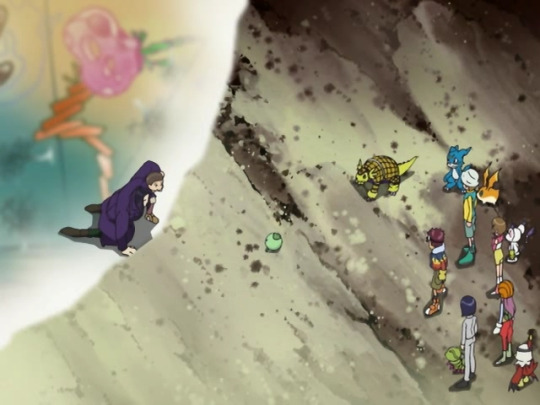
By “finale” I don’t mean “epilogue”, but rather the final battle and confrontation that make up 02 episodes 48-50. Generally speaking, 02 is a series that is much less about progression of plot events as much as it’s about theme and message, and my feeling is that this becomes increasingly so the deeper you get into its second half and approach its ending. Narratively speaking, we need a big, bad enemy to beat up in a fight, but if we shift our perspective a bit, what does this finale say as a close to 02′s themes and concepts?
The thin boundary between good and evil
Our major enemy for the first half of the series was the Digimon Kaiser, who was later established to be the very naturally kind Ichijouji Ken -- which is a pretty massive swerve, considering that most series with “reformed villains” would usually make them a bit of an edgelord who happens to be a little nicer. But instead, the series goes very deep into the psyche of what could make such a kind child be tipped over the edge, and, even though it’s all revealed to be accelerated by supernatural interference, it’s made very clear that his own trauma and insecurity was most of what did it.
So, anyway, it’s revealed in the end that the “final mastermind” behind it all was none other than Vamdemon, an effective midboss from Adventure. Vamdemon’s popularity aside, this initially seems like a very strange choice. But looking at some statements about 02′s initial planning is somewhat revealing: the original planned concept for the final boss was a Digimon that would ultimately be reduced to only “an idea” (and was rejected on the grounds of being too gory for the Sunday morning kids’ timeslot). When you think about this original concept of “a Digimon that had been reduced to only an idea,” that explains the initially odd-seeming combo of defeating a Digimon with the combined power of idealistic positivity, because it’s a plot point that would certainly make more sense if said Digimon had been reduced to a spirit of malice.
However, the interesting part about this is that the replacement for this original final boss was not Vamdemon but Oikawa and his lackeys, which means that, substantially, the real “final enemy” of this story is actually Oikawa, and the ideological questions he poses for the Chosen Children and those around them. Vamdemon may be the “mastermind” from a plot perspective, but, ironically, his important role is actually to define Oikawa’s narrative -- and, as if to drive this in further, he’s not even voiced by his original voice actor from Adventure (Ohtomo Ryuuzaburou), but Oikawa’s own, Morikawa Toshiyuki (and this voice change is actually pointed out in the series proper, too).
So why Vamdemon and not just a random spirit of malice? Well...
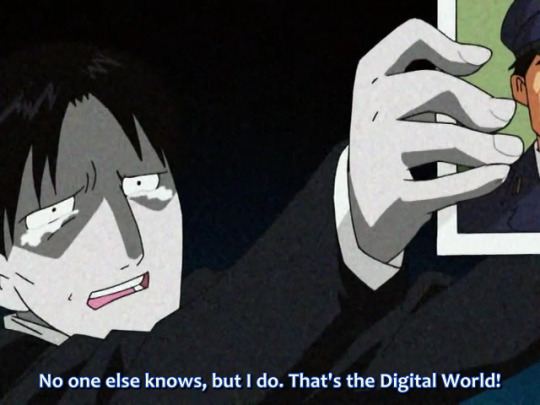
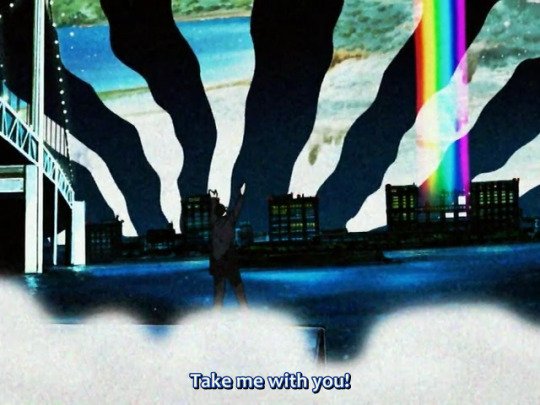
Vamdemon’s presence specifically establishes the precise moment in time Oikawa lost complete control of himself -- and, more widely, establishes the connection between himself as a “Chosen Child who could never become one”. Prior to this episode, we knew that Hida Hiroki’s death and their shared childhood had some relevance to Oikawa’s downfall, but the August 3 “Odaiba fog” incident in 1999 is the exact moment where everything could completely crash down in front of Oikawa’s eyes, with Hida Hiroki having just died, and Oikawa personally witnessing Digimon, the Digital World, and the Chosen Children (and boy, the way this scene is framed with him right next to the waterfront, you might even wonder what he might have done with himself had Vamdemon not interfered...). The Digital World didn’t have a huge amount of contact with the world before then -- in fact, Oikawa not being able to make much contact is a huge part of his character arc -- which basically leaves this as one of the only moments you can have this exact moment of Oikawa being ready to go over the deep end in this way. All of his regrets, of never being able to make proper contact with the Digital World, of Hiroki having died and left him alone, are ready for him in this exact moment -- as his own lackey Archnemon had said earlier, “human weaknesses are easy to manipulate.”
Moreover, of all of the “entities of malice” that made up Adventure’s villains, Vamdemon’s the only one who brought it all the way over to the real world (where the majority of 02′s conflict is set). This brief moment of contact with the real world was established in 02 episode 14 to be the defining moment of “contact” that would lead to Daisuke and Iori becoming Chosen Children. Particularly in the case of Iori, you can see the parallel -- Hiroki’s death and the resulting incident here would shape Iori’s strive to become a model citizen and a hero as a Chosen Child, whereas the exact same incidents shaped Oikawa’s descent into villainy.
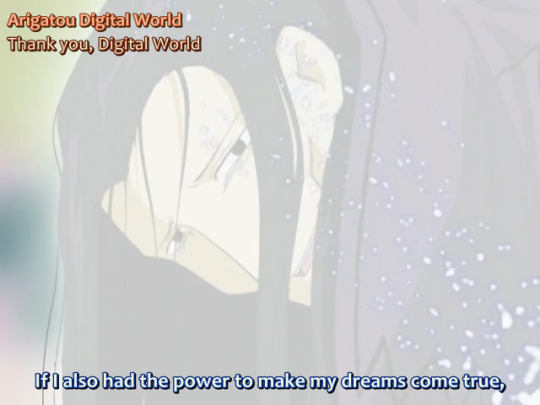
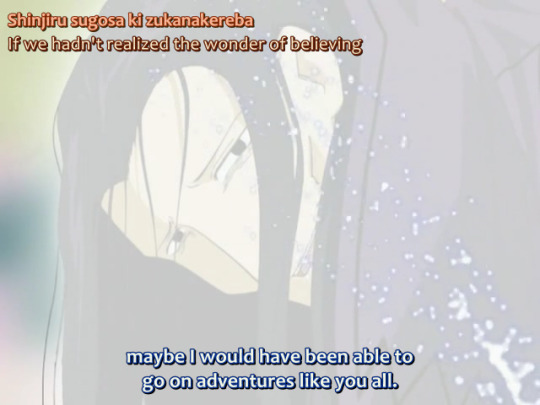
Oikawa’s “sacrifice” in the end is not really a sacrifice in terms of sacrificing his life -- it’s said outright that his body is deteriorating, and so he would have died either way. What Oikawa does sacrifice is the ability to take one more step and make proper contact with Pipimon -- it is explicitly stated that he has to use the power of the dream world to grant his wish, meaning that he would never be able to take a proper step into the Digital World as a human, and therefore would never truly be able to have his initial wish granted in the way he originally wanted.
Thus, Oikawa leaves off with one last “regret” -- that, perhaps, if things had been different, he could have been just like the Chosen Children, going on “adventures” like them. But Iori points out right after that he did achieve his dream in some sense -- he got to reunite with the Digital World, and he did get to meet his partner, and so: it’s all about mentality. All of what happened to Oikawa was because of his own closed-in way of seeing himself and his place in the world, instead of being able to move on productively from his perception of what he “could and couldn’t do”.
In the end, Iori, the one who had once been so cold towards the idea of anything remotely associated with evil, is the one to guide him to that answer, and the other Chosen Children, who had previously not been very sympathetic towards him, still grieve over his death because they understand what it means to have a partner, and the sense of loss it would entail to be separated from one. It’s the one commonality they all can understand, and in the end, none of them were really all that different; it was just what they chose to do with what they had.
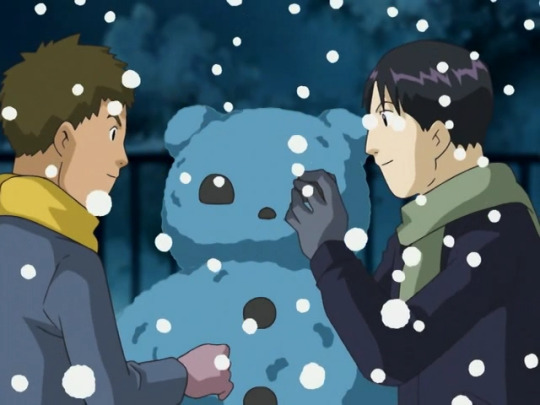
This is especially because we see extensive flashbacks of Oikawa in 02 episode 47, and his design is that of a completely average adult in 02, nothing like the “look at this instant villain!” design he had during the course of the series. Oikawa was, for all intents and purposes, a completely average person who had dreams that he shared with his friend, dreams that they carried into adulthood -- it took this little to push Oikawa over the edge, and yet the things that did it were the exact same things that, in a different context, Iori took to become a Chosen Child who fought him on the other side.
False happiness and pointless fixations
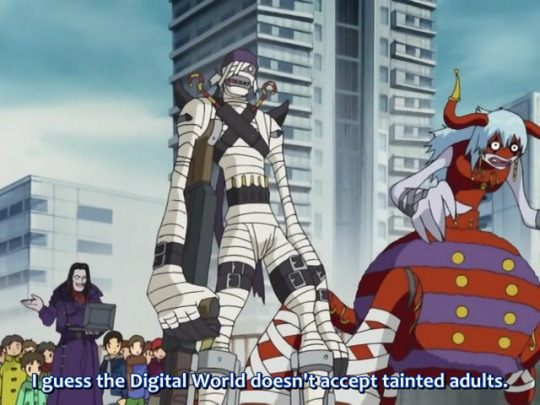
Tying into Oikawa’s fixation with “regrets” and an unhealthy mentality about his own position, Oikawa blames his inability to go to the Digital World in 02 episode 48 on himself being a “tainted adult”, not recognizing that it’s his own having fallen off the deep end that’s the likely reason he’s being rejected. Oikawa is, effectively, maintaining a fixation on “regrets” and a past he can’t get back; he’s still stuck on the image of his happy childhood playing with Hiroki, and all of the things he “couldn’t do” as a child after having his initial contact with the Digital World cut off. The ending reveals that he had met Pipimon before, and so you can interpret everything he’d done beforehand -- including creating two Digimon that are ultimately his “minions” more than they’re his actual “partners” (and were ultimately ripped away from him by the very same malicious spirit that represents his nihilism) -- as an attempt to reconnect with that partner, even if it resulted in him forgetting his actual purpose.
Beyond that, the Chosen Children themselves are momentarily sidetracked by a “fixation” of sorts --
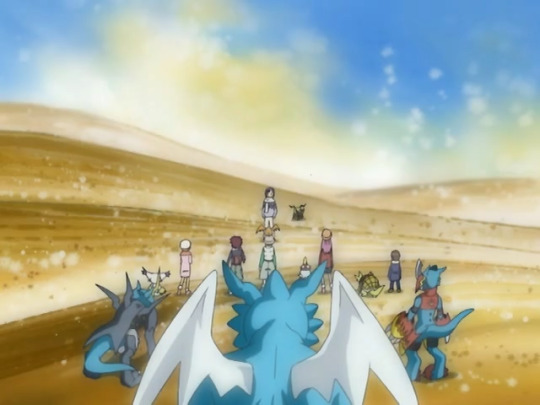
02 is a series about “accepting things and moving forward”, so each of the illusions presented by BelialVamdemon have to do with a fixation that’s holding each respective kid back:
Takeru’s idea of seeing his family together again might not be completely impossible, but it’s probably not happening anytime soon -- and, as far as 02 episode 17 and 47 showed us, relations are at least improving and everyone else is doing a much better job of actually moving on and accepting the current state of affairs than he is.
Iori’s fixated on the idea of being able to please and be with a father who’s long dead (again, his issue is technically the same one Oikawa’s fixating over).
Hikari’s fixated on a future idea and dream that she wants to see pass, which won’t happen unless she can proactively work towards it now (and the 02 epilogue itself establishes that getting there won’t be all sunshine and roses).
Miyako’s fixated on her surface mood of stress and a desire to escape it, only to be confronted with the fact that it doesn’t actually make her all that happy either.
Ken’s fixated on ideas of “punishment” and “forgiveness” that ultimately won’t get him anywhere.
In the end, the one to avoid it is the most “forward-thinking” of all of them, Daisuke, who’s least likely to get caught up in such fixations. But even he has this to say:
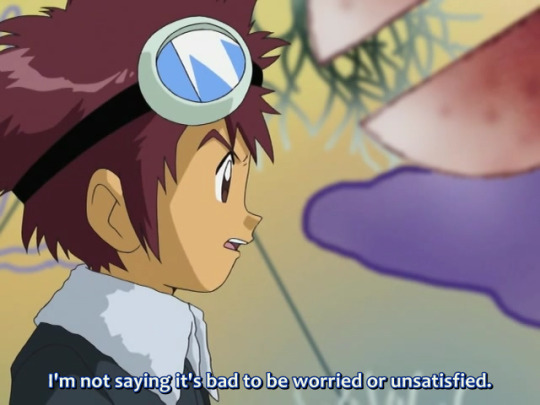
Daisuke understands that not everyone is as simple-minded as him, and that’s not inherently a bad thing -- it’s just that when you need to go forward, you need to go forward (and people who exploit others’ weaknesses against them are still unforgivable jerks). You need to accept that things are the way they are at current, and use the information you get from it to keep moving forward and do something productive with it rather than clinging onto things you can’t have to the point you can’t do anything. Nobody was giving anyone shame for having those internal worries that BelialVamdemon plagued them with -- it’s just that staying in there forever, instead of moving on with important things they had to do, wouldn’t be good for them either.
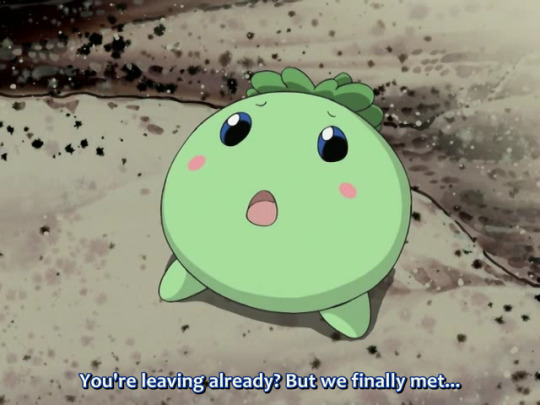
Hence, that’s what Oikawa actually sacrificed -- he had a choice to use his final moments to spend his remaining short time with his partner that he’d spent so long unconsciously chasing after, but he instead decides to do something to help the Digital World and reverse some of the damage he’d personally caused instead of continuing to fixate on that regret. At the very least, he can continue to be with Pipimon in some other sense, even if it’s not what he originally wanted.
The pressure to be a “perfect person” as imposed by society; the conflict between that and pursuing one’s own happiness
In the last section, I mentioned that Oikawa was the kind of person who fixated on regrets about what he “couldn’t do” during his childhood. You can identify a bit of what was leading up to this in the prior episodes:
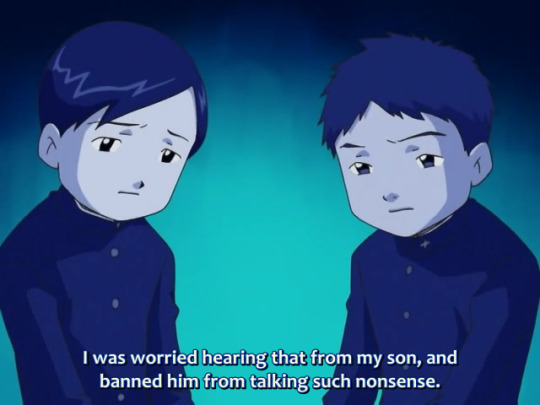
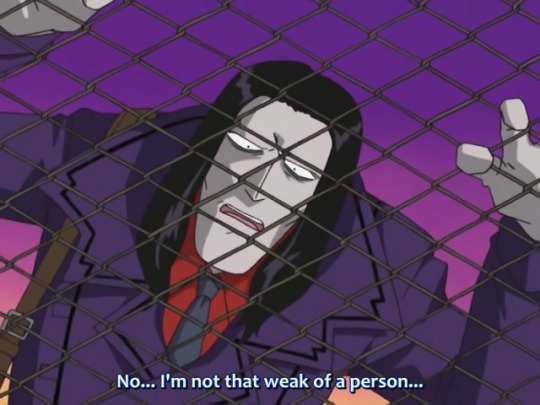
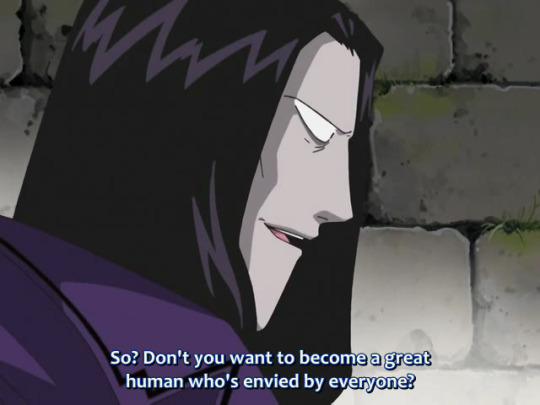
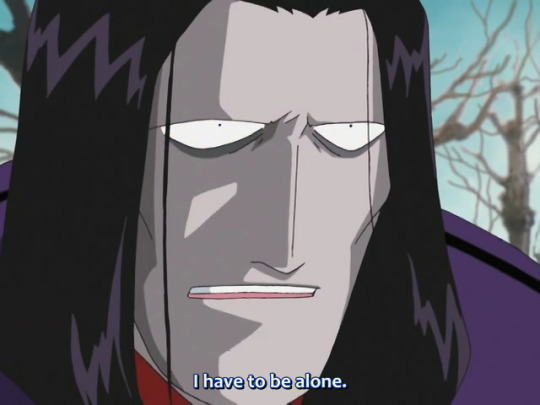
We learn in 02 episode 47 that Iori’s grandfather Chikara made the mistake of barring Hiroki and Oikawa from getting too deep into their connection with the Digital World, considering it “nonsense”, which led to the two of them becoming disconnected from it and continuing to wistfully chase after it -- which also led to Oikawa being driven further over the deep end when Hiroki, the only person who understood that, died.
Moreover, Oikawa ended up developing a complex not entirely unlike the Kaiser’s fixation with being a “perfect” person in the first half -- and, just like how he blames his inability to enter the Digital World on being a “tainted adult”, he fails to have the self-awareness that it’s this exact nihilism keeping him out of it, taking even further offense at the idea of him being a “tainted existence” (because of what he’s embracing) and deciding that his reaction needs to be sinking even deeper into it. And while he implants the Dark Seeds into the children with the intent of exploiting their power, he also indicates that he thinks he’s doing them a favor by enabling that ideology of “becoming a perfect person” within them.
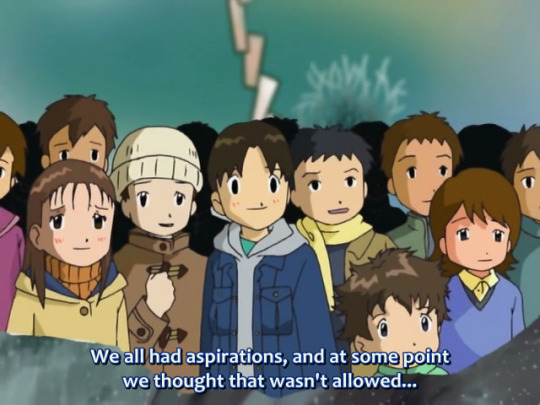
Remembering that the final battle in this series is not necessarily about the physical fight as much as it’s about the ideology that Oikawa espoused, in the end, what Oikawa really “implanted” in these kids along with the Dark Seeds was the pressure that they should sacrifice their happiness to be “perfect” people. The Chosen Children reach out to them by asking about their dreams, and the children list off careers that have certainly gotten their parents scorning them for not being “good enough” for them, or gotten them mocked by other people (Hiroshi says that he gave up on his manga artist dreams because people laughed at him for it). In the end, “the pressure to be ambitious” is pressure in itself -- what if what you really want isn’t ambitious as much as it’s something that makes you and others happy (like, for instance, ramen making)? And especially when you’re a child -- shouldn’t this be the time when you enjoy yourself to the fullest?
This is even alluded to in Ken’s Spring 2003 track, in terms of how he and Osamu weren’t able to enjoy their childhood because of that pressure:
You were demanded to grow up fast, weren’t you, Brother?
Because we were always being evaluated and compared by someone, we didn’t get a chance to have more freedom. We didn’t have any chances to run down an alley because we felt like it, or pull up weeds, or tumble around… meaningless things, things that didn’t bring any value to us at all.
Just like the cat napping on the roof… we weren’t able to fully enjoy any everlasting freedom.
Like Ken and Osamu, the Dark Seed children accepted the Seeds because they decided that it would be better to trade in their happiness in exchange for getting closer to that ideal of “perfection”, only to destroy their own selves in the process. Which is accentuated when acknowledging their own selves is what leads to them meeting their own Digimon partners.
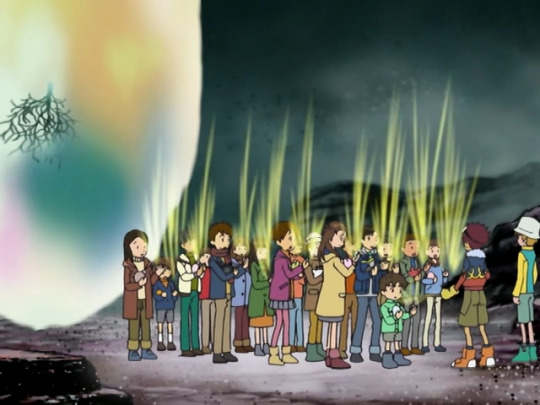
Takeru had said, earlier, that the Digimon will appear if you wish them to -- and given that a Digimon partner is a metaphor for the inner self, it says a lot that the point here is “the key to connecting with your partner is to connect with your actual self”. Like how Ken managed to reunite with Wormmon in 02 episode 23 by accepting everything about himself and resolving to live with it, and how Oikawa will later meet Pipimon after having come to terms with what he was actually looking for the entire time.

And in the end, what we see of Vamdemon isn’t really all that different from the original “reduced to an idea” concept we got from the original 02 final boss concept -- remember that BelialVamdemon has effectively become the incarnation of Oikawa’s own nihilistic ideology; perhaps he took on a lot more than just a voice actor! Actually, the whole sequence in 02 episode 50 with everyone listing off their dreams and destroying BelialVamdemon part by part is relatively similar in substance to the original proposal (the staff must have been really attached to that idea). And, hence, why what destroys him for good is the combined feelings of everyone together, resolving to move forward instead of chasing after meaningless things.
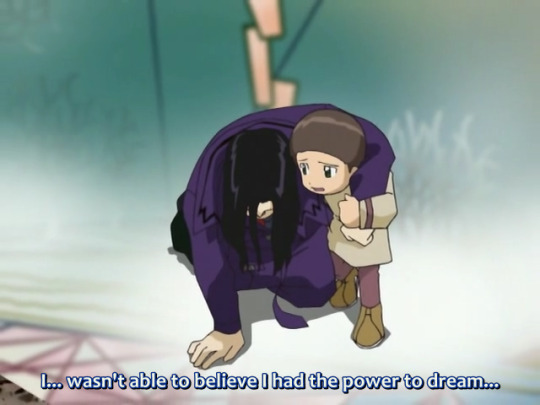
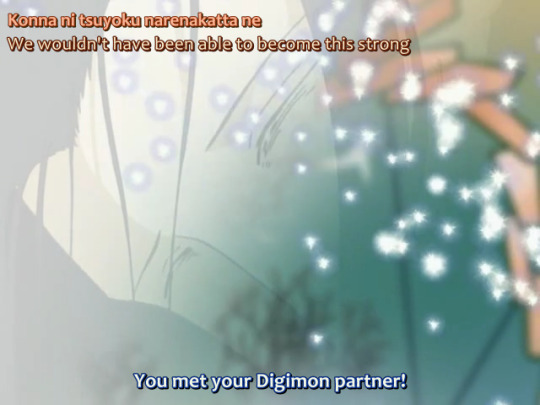
Oikawa ultimately recognizes that what was holding him back was his own mentality -- everyone here, Ken, the Dark Seed children, and Oikawa himself, all thought they were becoming “strong” and “perfect” people by ignoring them, but instead ended up as pawns for others, and all of these people could have found better ways to cope with their problems through embracing themselves and finding support, and would have come closer to those “dreams” while they were at it. Instead, Oikawa exploited others and clung onto shallow symbols because he thought that kind of straightforward idealism was an impossible route for him, and locked himself out of all of it. But in the end, he’s able to do something -- he’s able to use his “dreams” to have the Digital World healed -- and with that, is able to have his last moments in happiness.
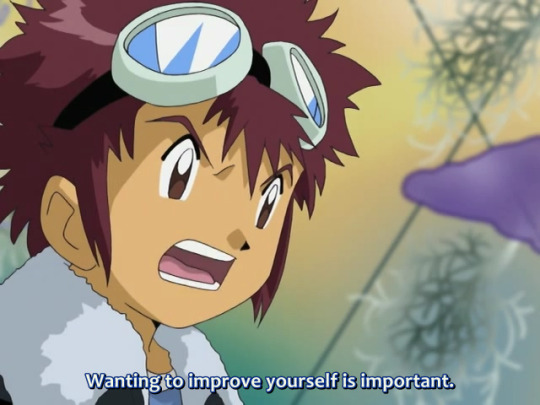
Incidentally, back in 02 episode 49, Daisuke had even outright said that there’s no inherent issue in striving for self-improvement (after all, both Adventure and 02 were about people slowly getting past their insecurities and becoming better people). Daisuke himself is a person who’s improved a lot over the course of this series! But that’s something you need to do on your own terms and in a way you’re comfortable with -- not forcing yourself into the mold of an “ideal person” at the expense of losing everything about yourself, like Ken, the Dark Seed children, and Oikawa all did at some point.
67 notes
·
View notes
Note
10, 17, 23?
These are so fun, thank you!
10. Most disliked arc? Why?
This is controversial, so disclaimer: I like Morrigan. I am extremely happy to have queer lady rep on a personal level.
But all rep is not automatically good rep, and in this case, I think the real problem is bad writing.
It is extremely clear in acomaf that sjm had one dynamic planned...and in between books canned it for another, but kept pieces...which further makes EVEN LESS SENSE. Feyre is super interested in how close Mor/Cas/Az are- she doesn’t really get what’s happening, but the focus on closeness is repeated, again and again and again. I’m going to come back to this, but basically, in no version is their history not Complex and not Something Feyre is Probably Getting Wrong for Assuming Straightness.
And then we have queer (and I’m using queer because the books don’t make it clear what her sexuality is- maybe she’s a lesbian. maybe she’s bi but only romantically attracted to women, we don’t know) Morrigan. And it takes what acomaf set up and makes it so much worse?
We go from Morrigan who forged a path and chose a family (a very queer trope, hey I wonder, that whole found family cannot also be straight???) to Morrigan, trapped between her two best friends by several entangled, terrible things. Azriel, who now scares her? Cassian, who she slept with at a cost that was ultimately MegaTrauma for both of them, and literal torture for her. Morrigan who maybe slept with someone she wasn’t even attracted to just for autonomy as a teen....and then definitely slept with Helion when she did not want to..to set a boundary with Az??
Can you hear me screaming?
Okay- so how do we fix this? How do we make this less of a goddamn weird choice? First of all, let’s take out the homophobia at all. High Fae are immortal- they have partners that aren’t the same species, why on earth would gender matter?
Cool, Morrigan is queer, but Morrigan didn’t live in fear of her best friends for five centuries.
But what do we do with the closeness, the rabid protectiveness? High fae don’t care who you bang, but you know who would, if we have to stay in canon’s shitty lil world? Illyrians, who safeguard their bloodlines in horrific ways already.
Azriel hates Illyria so much in the books- so much more than Cassian or Rhysand. Why might that be? Why won’t he go back- hey, maybe Azriel is gay.
Feyre’s Straight Vision, and also the viewpoint of a twentyish woman whose never gotten to see..anything: is that, LOVE? since you a man are looking at Morrigan who is wearing a wild cool dress
Az, watching to make sure no one is bothering Morrigan in the crowd: Solidarity (maybe based on horrific trauma or something)
Let’s compound further. Canon does it for us- Rhysand tells Feyre that Cassian slept with Morrigan as a dumb teen because he was jealous of all the time she was spending with Az. Not- he was jealous over Morrigan, he was jealous of Morrigan.
Bisexual Cassian babes- still figuring it out, but jealous about his hot best friend. And then, hello, terrible plot, totally traumatized by his first sexy exploits with a lady.
This closes the final loop: if Morrigan doesn’t want Az or Cassian, why is she so aggressive with Nesta? Because, after all they’ve been through, they’re all obsessed with protecting each other. I do think a happier, freer Mor would be a lot less terrible about Nesta, but a little shovel-talk bullshit would remain.
Because they all found each other and chose each other and protect each other, because they know being who they are isn’t always safe. Queer solidarity. Not to mention that Nesta is the first woman it’s been clear Cassian is going to absolutely fall for! No one wants him to get hurt again.
In sum: canon queer Mor bad, the possibility that didn’t happen of queer IC good?
17. Instead of XYZ happening, I would have made ABC happen…
Okay, I totally went this way for the first question, but I have a different answer!
Instead of the solstice party being the lowest point for Nesta, I would have made it the breaking point for Cassian.
He notices there’s no gift for her in the pile. Assumes kind of tiredly/sadly/bitterly that she isn’t coming- but then watches her show up. Sees the way no one even says hello to her, the resigned, sad face she makes when Elain hands her that glass of wine she didn’t ask for. Further watches Elain uncharacteristically throw back a drink, just to have to deal with peacekeeping.
And Cassian just feels sick. She’s lost so much weight- still beautiful, still so heartbreakingly Nesta, but like she’s going to shatter at any moment. And Cassian whose grieving, who lost so many of his people and in the end couldn’t protect her- Cassian cannot stand to watch that.
He makes it easy for her. Jokingly steals the glass of wine with some aside and drinks it himself. Doesn’t leave her alone. Doesn’t even look up to watch the self-made spectacle of Morrigan unwrapping lingerie- he’s too busy very quietly handing Nesta her single present, from him. She pockets it, wrapped, but Cassian will swear there’s something there to her nod, a softening for just a second.
When Nesta leaves- the second she can, the moment it’s over, Cassian finds her coat, goes with her. His presence stops Feyre from chasing after her. They don’t even talk. He just keeps up with her angry storming across town, lets her rage with her entire body because it’s like all the light suddenly returned- she’s hurt.
Nesta is hurt and he can help. Nesta is alone, and how could she not be? She doesn’t fit in this Court, doesn’t belong playing nice when Rhys hates her, when Feyre is happiest ignoring her- when Cassian himself feels like he’s outside looking in from the icy peaks of Illyria, out of place with the world feysand want now.
Walks her to her door, safe. Doesn’t press to go in, doesn’t overstep. Just tells her good night, tells her, happy solstice Nesta. Returns the next morning with breakfast he won’t mention goes uneaten, the day after and day after, until she’s waiting when he arrives and stomps down to the actually good bakery down the street with him.
Cassian never really leaves her alone again.
But first, behind six locks, under the light of the moon, Nesta will sit in her bed and look at the precisely wrapped beautiful gift Cassian, of everyone- her whole family, her whole world- thought to give her. She won’t open it until she’s ready, but Nesta will keep it.
Nesta will never forget.
23. Unpopular character you love?
No one talks about him, but I can only imagine Varian is very, very cool dude. I cannot fathom anything but the complete lack of toxic masculinity that would be needed to look at a monstrous celestial being of a lady and be like, yep, I’m Just A Hot Sailor whose Kind of a Prince but I’ll love her quietly forever anyway.
Cresseida! Like, what, we’re supposed to dislike her for responded to Rhysand’s shitty flirting because she’s lonely because ya know, Amarantha killed the people she loves? Come on. Gimme that difficult woman rep.
He’s from ToG instead, but I love Lorcan. He’s just...such a dweeb. An emo little himbo mess. He’s so massively dumb about all his feelings unless they relate directly to Elide while she’s standing in front of him and even then, is getting them right at about 60% capacity unless it’s life or death and then he abruptly Gets It. Is willing to become Lord Lorcan Lochan for the rest of his days. Ruthless mess. Love it.
21 notes
·
View notes
Text
The Untamed, episode 48 - watching notes
I've got more tissues prepared because Yunmeng bro feelings always hit me HARD and that's where I left off last time
I find it kinda sweet that lwj is defending Wen Ning
It makes so much sense for Jiang Cheng to immediately bring up his old resentment cor the way his father treated then up. It really all goes back to that. The feeling of being always second best, both to his father in comparison to wwx and to wwx in comparison to lwj. And while wwx sacrificed his core because he thought of himself as inferior to Jiang cheng (not in skill but in worth), to Jiang Cheng it comes off as him once more playing the hero :/
All in all THESE IDIOTS NEVER LEARNED TO PROPERLY COMMUNICATE
Also the way Jiang cheng says "then what am I?" Reminds me a lot of the way he grieved for his core
You know what fucked me up most during this whole conversation?
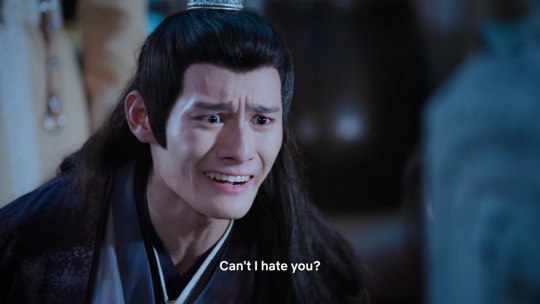
Because that's it. He can't! 😭
He still loves wei Wuxian and he can't understand why wwx never chose him. Why he chose to protect lwj and the wens when he knew it would endanger their clan. And from that perspective, I get it. I feel like to Jiang Cheng, his clan is everything. It's only natural. He is the (future) clan leader and he was raised that way. It was always going to be his responsibility and at the same time, he always had this very clear cut role in their society.
But wei Wuxian? He loved their family and he did feel at home at their clan, but he was still very much an outsider. Madam Yu hated him, people kept calling him a servant when it suited them and told him to mind his place as such when he spoke up. He could emphasize with the outcasts of society because he himself never truly left that outsider status behind either!
Which left him and Jiang Cheng in opposing positions with no way of understanding the other's point of view
... while still loving each other
😭
Because all they were in the beginning, was two boys being brothers 😥
Which leads me to the conclusion that, once more, the true enemy of this story isn't any single person, it's society.
Okay, sorry that this essentially turned into meta. That's probably not what you're here for, but as thus show comes to an end, I have FEELINGS and THOUGHTS and I need to get them out 😅
I have another rant in my head on whether or not I think wwx was right in transferring Jiang Cheng his ckre without telling him, but I'm holding that in for now 🙈
That I'm sorry. From BOTH of them. 😭
THAT'S GROWTH!!! 😭😭😭
Wei Wuxian saying that it's all in the past now made me cry. So. Much. Because it's an ending. It sounded to me like he wanted to wipe the slate clean. No promises. No betrayals. Start anew. And ... I'm not okay 💔😥
Hey Nie Huaisang. Welcome to the party :D
Um ... what's happening?
Are they ... burning?
Jin Guangyao played with fire and got burned or what kind of metaphor is this?
I'd be about as good as nie Huaisang at hiding my reaction in that situation, tbh ^^
This is the weirdest hostage situation I have ever seen, with everybody just running around sind no one even guarding the hostages
The hell is in that tomb? 😳
Wait ... nie Mingjue was the headless corpse? And okay, the head is obviously seen back on here but ... how did it get there so quickly and WHY is Jin Guangyao surprised?? Wasn't he in possession of the head??
I.am.confused
Poor Huaisang :'(
And poor Jin Ling. He's learning quickly just how fucked up his family is 😬
*dramatic thunder in the distance*
👆 favourite trope of mine :D
It's an oldie but a goodie
Wwx understands something I don't ^^
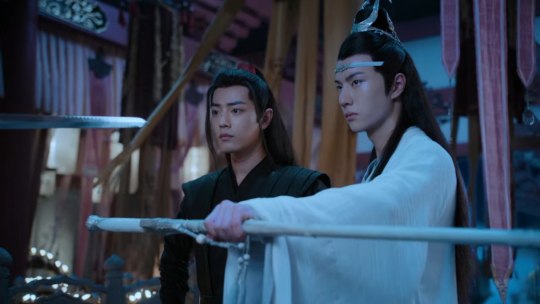
Also nice to know that even when they're both without powers lwj will still protect his husband 🥰
Okay, so ... someone put the body there. The same somebody who orchestrated everything else
WHO??
Omg, I love how wwx plays at Jin Guangyao's paranoia by essentially manipulating him as he did others and then turns to lwj, with a little shrug and a half smile like
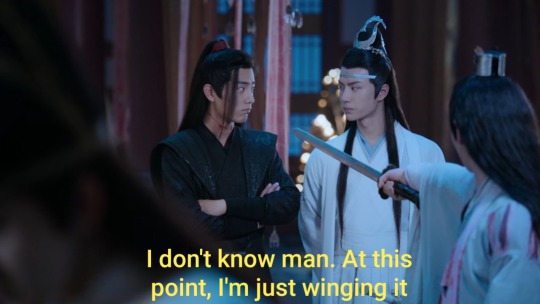
CAN I PLEASE GET 50 EPISODES OF THESE TWO SOLVING MONSTER OF THE WEEK MYSTERIES TOGETHER? 😭
So they FINALLY thought it was a good idea to actually restrain their hostages. Genius!
Wait ... Su She has that hole curse, too?
OHHHH
He was the one who cursed Jin Zixun???
I hadn't even thought about the fact that that was still an unanswered question! 😱😱😱
Jgy telling wwx that they were always going to end up on opposite sides is SO interesting and betrays a level of self-awareness I would not have afforded this guy
The thing is, su she raging at lwj for this is really the wrong address. Not because what he says isn't at least partially right (lwj was born into privilege and there is a stark disparity in how clan disciples and peripheral disciples are treated), even in the lan clan, but not BY lan Wangji. He's the guy who knelt before his uncle and let himself, the sect leader's son, be punished alongside the servant's son.
It's fascinating to see Jin Guangyao's mask fall
And his view of wwx is even more fascinating
He deliberately used wwx status as an outsider to society in combination with his impulsive and righteous character to further his own agenda of setting his own status as an outsider
It's like the ULTIMATE Slytherin vs. Gryffindor story line 😁
Also SOCIETY IS THE VILLAIN!!!
I'm not gonna lie, Jin Guangyao nakes some good points. Not saying he's not a terrible person or that he's not responsible for his own actions, but still he's successfully identified a lot of systematic problems in the cultivation world 🤷♀️
... and then proceeded to horribly exploit them for his own benefit *sighs*
Very sneaky, Wei Ying. I don't know what you're doing it, but good job getting him to keep talking
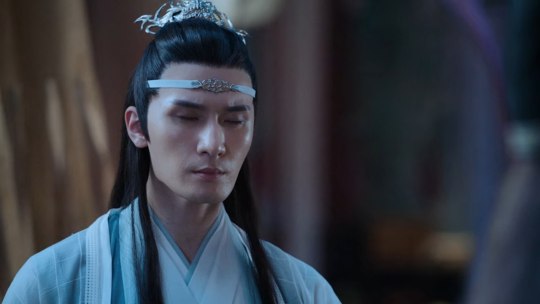
Xichen really be regretting all his life choices right now
It breaks my heartba bot, knowing that they really did bond that first time they met. And Xichen believed in him ever since 🥺
As sorry as I feel for him, I'm pretty sure it's going to get worse 🙈
OH MY GOD WWX CAN CONTROL GHOSTS BY WHISTLING ALONE NOW?
That is simultaneously SO cool and SO creepy! 😱
And kinda hot
On a related note, I realized that wwx is basically a Necromancer Bard and now I really wanna play one
Ohhh, the sword ghost!
😳
Isn't Xichen without powers right now?
No!!!
Puh, su she didn't kill him
But now I'm confused how lwj can use his powers
Ohhh
He's got the stygian tiger amulet?
I'm missing some crucial bit of plot here because I fo not know how he could have gotten it
I mean ... Xue Yang had half of it right? So ... is it this piece?

HE PLANNED THE WHOLE THING ALREADY BACK THEN??? 😱
Or ... not the whole thing? I feel I'll have to watch the show again just to discover what Jin Guangyao even knew and when 🙈
The way jgy looks at Xichen, there us real affection and regret in his gaze :(
Still I did not see THIS coming

He does care for Xichen, doesn't he? Who always saw the best in him. Never once treated him as below him for who his mother was.
But I dont think lan Xichen will give him a second chance right now, tbh. Just from the way he acted, he looked like his trust was irreparably shattered 😥
Meanwhile...
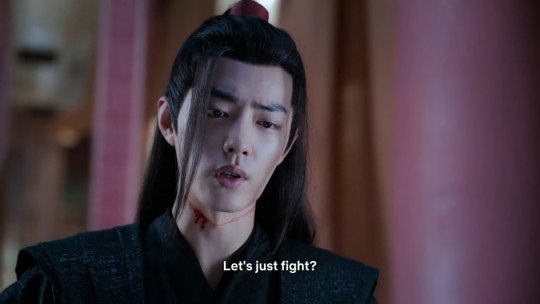
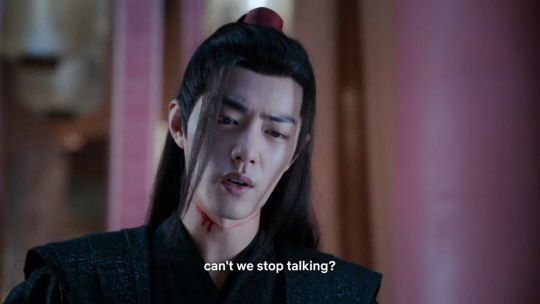
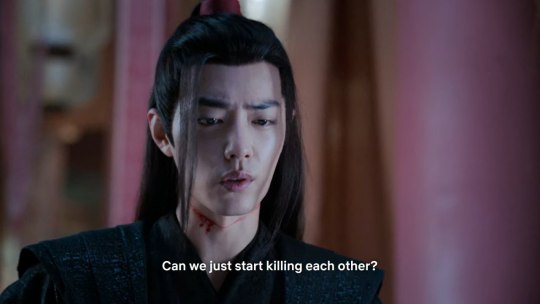
Wwx is tired of your monologueing :D
I apologise for the weird mix of stream-of-cosciousness musings and half-formed meta musings 😅
Also all the typos ...
(And who sent the letter and hit the body??? 😭)
@sweetlittlevampire @fandom-glazed @elenirlachlagos @allhailthedramallama @luckymoony @kyrrahbird @i-love-him-on-purpose
Tomorrow I'll watch the jast two episodes and ... I can't quite believe it 😔
I'm just happy that I'm reading the book now and still got so much to look forward to there, otherwise I think l might draw out this show even longer
#the untamed#sophie watches the untamed#wei wuxian#wwx#lan wangji#wangxian#lan xichen#jin guangyao#jin ling#jiang cheng#nie huaisang
77 notes
·
View notes
Text
Avengers: Endgame [Personal] Review
After 11 years and 21 films, we get the culmination to a cinematic franchise unlike anything we've ever seen before, and it is everything we expected it to be–even the bad ones.
What Avengers: Endgame does well, it does REALLY well. It's hard to imagine, at this point, any other franchise being able to churn out an output of this caliber. On the other hand, what Endgame got wrong, it got VERY wrong. And it's all the more frustrating to think they would never have gotten this right, anyway. Even with its (debatably) best release to date, the MCU still failed at the one thing it never got right: it's female heroes.
(But, to be fair, Marvel perennially disappoints every other character who isn't played by Robert Downey Jr., so no surprise here.)
So let's start with Endgame's biggest, most disgusting, but easily solvable mistake: killing off Black Widow.
To give credit where it's due, the Marvel comics was made at a time when women were still largely seen as less than a person; when their worth only went as far as their ability to hold babies in their wombs and arms. And with the MCU being heavily based on those materials, it's not surprising that the movies carried these oppressive sentiments too.
Even so, the MCU wasn't made in the 40s. Majority of it is set today, for today's audiences. So the fact that it still chose to carry those misogynistic, outdated values is just plain ridiculous.
And the Black Widow, in all her iteration be it in the comics or movies, is still very much a product of those values. She is very rarely, if at all, portrayed as a person on her own, without being defined by her connections to others–specifically the men around her. In the MCU, this was most obvious in her god-awful portrayal at Whedon's Age of Ultron. She was the classic damsel in distress: just another girlfriend/wife character whose express purpose was to be saved by a man, and be a platform with which to show HIS heroics. Worse, Widow explicitly called herself a "monster" during AoU when she was talking about, of all things, being sterilized.
Umm... what? She thought herself a "monster", not because she kills people in cold blood, topples world organizations, and threatens the peace of nations... but because she can't be a mom?
Yikes.
AoU was already a massive fall from grace for Black Widow, from whom we finally got to see some well-deserved badassery, and definitive lack of sexualization, with The Winter Soldier JUST ONE MOVIE AGO. But what's even worse was that this same trope was covertly exploited again in Endgame with–literally–Black Widow sacrificing herself because Hawkeye has a (dead) family.
It's like, hey girls! If you don't have a family of your own, then feel free to throw yourself off a cliff!
The MCU and its proliferation of male directors and producers never, ever knew what to do with Black Widow, so I imagine it was with a sigh of relief that they FINALLY got rid of her, the first chance they get. And if you think I'm making this up, guess again: Endgame writers themselves (Stephen McFeely, Christopher Markus) said, and I quote, "Her journey, in our minds, had come to an end if she could get the Avengers back."
That's it. That's the sum of Black Widow's character. She was always just a supporting role. She was never a plot. She was just another plot device. If her male colleagues can do their heroics, then her purpose for existing, in the writers' minds, has been served.
Never mind that Natasha Romanoff had the most character development in the entire franchise. Never mind that she was a direct support to 4 of 5 of the other Original Six, and was literally instrumental in making THEM into the heroes they were (Iron Man's recruitment, the Hulk's pathetic and flimsy lullaby, her partnerships with Hawkeye and Cap).
Maybe it might have been easier to take if she was as discarded as Hawkeye. But Black Widow didn't simply disappear in the mainstream storyline for periods of a time with a convenient explanation: she has always been at the center stage in one form or another. Always in conjunction with another character, sure, but THERE, regardless, which is more than we can say for Hawkeye, who really only appears (extensively) in Avengers movies.
But despite how central Black Widow actually is to the entire MCU, she still gets fridged at the first opportunity. Now that Marvel can safely say it has other females on the Avengers roster, they don’t hesitate to throw Widow under the bus (or off a cliff), and still manage to over-glorify and cloyingly romanticize female martyrdom at the expense of helping her male colleagues along. And she didn’t even get the send-off she deserved (hell, even Gamora had more drama around her death). They mourn her for all of 5 minutes, then she gets a passing mention in Tony’s funeral. Now a point can be argued that Iron Man is a public figure, he deserves a funeral, etc. etc., but think about the people who actually attended. None of them were outsiders. They were all, in one form or another, people in the Avengers immediate circle. There was no press. No cameras and grieving audiences ala Superman’s send-off in BvS. So why couldn't–didn't–they acknowledge Natasha Romanoff?
But it’s not over. Knowing full well that people will be angry at chucking off the MCU’s first real, if laughably flimsy, attempt at diversity, Endgame decides to soothe our ruffled feathers with, no surprise, fan service. The MCU may have killed off one of its most important female characters (both inside and outside the context of the cinematic universe), but fans can have 2 minutes of gIrL POwEr! Watch Captain Marvel zoom across an army of aliens (Where was she the whole time, by the way? Infinity War heavily implied a much important role for her, and they certainly touted her as the “strongest Marvel character” but she was completely useleess for 3/4s of the film… and barely on the last quarter), while the other sTRoNg ladies of the MCU have got her back!
Because 2 minutes is enough to compensate for a decade’s worth of callous disregard, of course.
And while those 2 minutes were certainly awesome and easily one of the highlights of the films, there’s no denying that it was all a blatant, pathetic attempt at pandering to a group Marvel never really much cared for. And those 2 minutes show you precisely what the MCU still is: a movie about boys, made by boys, for boys, who still don’t know how to handle women as people.
As amazing and kick-ass as those 2 minutes had been, they were an aberration in a longline of blatant disregard for female characters, and they could have easily been removed from the film because they contribute very, very little to the Infinity Saga’s narrative. McFeely and Marcus are even the first to admit: they only kept that scene in because it was “too fun”.
And just in case you think I’m just an angry, man-hating femi-nazi at this point, who only cares about fighting for women’s rights insofar as it puts me above men, look how Endgame also treated its male cast. Ant Man was nothing but a fussy, whiny, worrywart who couldn’t do the ONE thing that was supposed to be HIS thing: the quantum realm (guess who made that work? Iron Man!). Captain America was a selfish jerk who potentially messed up the entire MCU as we know it because he can’t get over his first crush (guess who was a selfless, self-sacrificing kid from New York? Iron Man!). The Hulk suddenly, miraculously lost the very essence of his character–his struggle between being Bruce and being the Hulk–with just a few punchlines about how he just decided to get the best of both worlds, as if he never could have possibly thought of that before, as if his struggles and demons never overwhelmed him so much to the point where he literally tried to kill himself (but guess, AGAIN, whose struggles and demons we DID see? Iron Man, of course you silly ninny!). Iron Man was given the VERY BEST of each of these characters, because duh, he’s Iron Man. Never mind that a SHARED cinematic universe wouldn’t have worked without other people to share it. Like the past three Avengers, Endgame is just another Iron Man movie.
Thank GOD he’s dead.
Finally, FINALLY Iron Man is gone. The overrated, over-powered Golden Boy will darken the Marvel Cinematic Universe no more, and we might finally get a film franchise that DOESN’T unflinchingly throw its characters under the bus for the chance to give its poster boy his 15 seconds of glory. Looking back at how Russos, and the production team behind Endgame, shamelessly claimed that Endgame is the story of Cap, Widow, and everyone who didn’t get their screen time on Infinity War, it is all the more irritating to watch 3 more hours of plot-armored Iron Man “saving the day”.
And that’s the tea for today.
PS: Can we talk about the fact how the ending with Cap literally ruined the entire movie (and universe) because of his messing with the timeline?
1 note
·
View note
Text
The Broken Saga
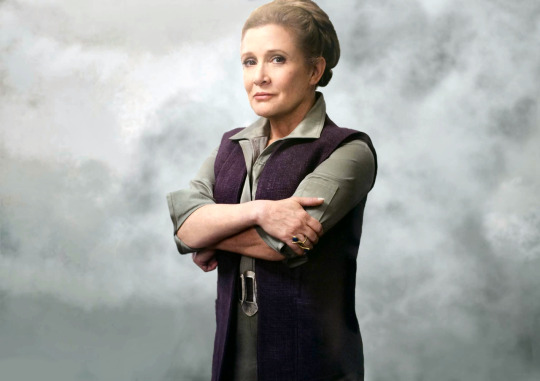
Author note: Like legions of other fans, I’m grieving the death of Carrie Fisher. My heart breaks for her daughter Billie and her and brother Todd, and I recognize that the silencing of Fisher’s unique voice is more important than the loss of the character she played.
This essay was difficult to write. Parts of it are a grief-filled rant. Parts of it explore my own thoughts about how the new saga can be concluded in a way which fulfills the storytellers’ intent while acknowledging the reality of Fisher’s death, and honoring the legacy she created in the iconic character of General Leia Organa.
Parts of this essay are angry. Because make no mistake, I’m angry.
The intentional and unintentional breaking of the saga
Return of the Jedi ended on a high note; Vader redeemed, the Empire defeated, the bright promise of the future in Luke’s Jedi and Leia and Han’s love for each other. In The Force Awakens, the creators chose to break the saga to provide the central conflict of the new trilogy. Lucasfilm and the Story Group took a risk in destroying all the ‘happily ever afters’ of the original trilogy when they began the new stories, and now, in a way they surely never intended, Carrie Fisher’s death has broken the saga in a manner that is irretrievable.
The Hollywood Reporter and other outlets recently published news that Rian Johnson and Colin Trevorrow (director of Episode IX), will be meeting this week (early January, 2017) with Lucasfilm president Kathleen Kennedy to discuss the way forward for the story in the wake of Fisher’s death on December 27. In the coming year and beyond, they will work to create a way to bring the new trilogy to the “deeply and profoundly satisfying” conclusion that Trevorrow promised us back in January of 2016, but Fisher’s death has, in many ways, forstalled this possibility. No matter what the creators choose to do, the new trilogy is now, at its core, a tragedy. Despite the fact that principal photography for VIII was concluded in mid-2016,– the pall of Fisher’s passing will shadow it too and may well affect the story Rian Johnson will give us at the end of this year.
“insiders say Leia was to have been a bigger part of Episode IX than VIII.”
- The Hollywood Reporter, January 5, 2017
It will never be alright again
Star Wars has always been a story about hope. Many of us see the new saga as an unwinding, or reversal of the tragedy of Anakin Skywalker. In this light, the opening words of the new saga, spoken by Lor San Tekka:
“This will begin to make things right,”
are resonant far beyond an implied jibe at George Lucas’ flawed prequels. Star Wars has always dealt in archetypes. In essays I wrote about the story during 2016*, I explored a number of different themes I see underpinning the new saga. From my first viewing of The Force Awakens, I believed that the large arc of the new trilogy will be one of homecoming, return, and redemption. As a fan who has spent the past year immersed in the world of the new saga, analyzing the plot, characters, and overarching themes of the new trilogy, reports that Fisher was anticipated to have a large role in Episode IX came as no surprise. All of central themes of the new saga can be gathered under the framework of one of the most ancient archetypal stories of all; The Prodigal Son.
Carrie Fisher’s death has rendered this tale difficult, if not impossible, to tell while remaining true to the characters created in both the original and sequel trilogies.
Of course Fisher was anticipated to have a large role in the final installment of the tale; what is the return of the prodigal son but a process of coming to terms with the people and relationships one has left behind? The prodigal seeks forgiveness. The prodigal comes home. TFA killed Ben Solo’s father in the universe of the Galaxy Far Far Away. Tragically, Fisher’s death means that General Organa will also be gone before the story ends. From a symbolic standpoint, there is now no “home” to which a repentant prodigal might return.
Unless it was filmed for VIII (and from a narrative standpoint, I have no expectation that it would have been), here are some of the things which will never happen in the galaxy far, far away:
Ben Organa Solo will never see the living face of his mother again.
They will never speak to each other.
Ben will never be able to ask his mother for forgiveness. Nor will she be able to ask for his.
Leia will never see her son in the light again. Never see him whole. Never see him happy. She’ll never dance at a wedding, never hold a Skywalker grandchild.
Lucasfilm and the story group, Pablo Hidalgo, JJ Abrams and Lawrence Kasdan, Kathleen Kennedy - all of them: they destroyed the happy ending of the Original Trilogy, and have left us with this. I weep. I am filled with rage. They have a lot to answer for. Of course no one imagined it would turn out this way, but the storytellers have broken Star Wars in a way that strikes close to its heart, and on some level, no matter what they do, they cannot fix it.
For those of us who have loved the character of Leia our entire lives, this is almost unbearably sad. The storytellers set this particular tale in motion; they took what proved to be an ugly, risky gamble in choosing to tell this particular tale. They have broken the saga, and no matter how they choose to end it, even if they do it well; with sensitivity and courage, they have doomed the new trilogy to some level of tragedy.
Because the terrible reality is that the only honorable, logical, narratively appropriate way to deal with Carrie Fisher’s real death is that in the story, General Leia Organa must also die. This adds a bizarre, free-floating grief to the reality of Fisher’s passing. The destruction of the story – it is another kind of death. For those of us who knew Fisher only through her work as an artist, it is a loss that is bitter, bitter to bear.
“…she burns very bright, and has such a great, generous energy…for that suddenly to not be on set…to have her character; not just her character in the movie, but her character, missing from that very small unit, is a tragedy.”
Adam Driver, speaking of Carrie Fisher, January 6, 2017, with Stephen Colbert
How does the story go now?
At recent conversation around our dinner table, our family talked about how we imagined the storytellers completing the trilogy without Carrie. Most of the ways in which movie makers have dealt with this kind of loss in the past felt deeply inappropriate. It’s possible that our responses are still being strongly shaped by grief – as I write this, we’re only a couple of weeks removed from Fisher’s death in December. Still, I suspect that the views of our average family, consisting of both casual and hard-core fans is pretty representative. Here’s how people felt:
No re-casting.
The Star Wars saga films should not be treated like yet another superhero retread. Carrie Fisher’s Leia Organa cannot be recast to be played by another person. She’s not Batman or Spiderman, a costume to be filled by whatever flavor-of-the-month up and comer is presently in vogue.
No CG.
This is a more difficult question, and a reality it is probably impossible to avoid. With the example of the re-animation of Grand Moff Tarkin (and god, the young Leia cameo) fresh before us in Rogue One, bringing a person back to life onscreen is obviously a newly-emerging reality. Rogue One showed us exactly what that technology can presently achieve, and it is both woefully inadequate to carry the weight of a significant role like Fisher’s, and ethically questionable. Fisher herself was famously outspoken about her unhappiness at being objectified as a fictional character, and railed against the overexposure and exploitation she felt surrounding some aspects of her fame as Princess Leia. She also understood how important the character was to many people:
“Movies were meant to stay on the screen, flat and large and colorful, gathering you up in their sweep of story, carrying you rollicking along to the end, then releasing you back into your unchanged life. But this movie misbehaved. It leaked out of the theater, poured off the screen, affected a lot of people so deeply that they required endless talismans and artifacts to stay connected to it.
Carrie Fisher, The Princess Diarist, page 194
In The Princess Diarist, Fisher describes making peace with the fact that Leia is her, and she is Leia. This passage hints at how she might have felt about the possibility of being turned into a computer-generated entity:
“It turns out she matters to me. Leia. I’ve spent the lion’s share of my life…being as much myself as Princess Leia. Answering questions about her, defending her…wondering who I’d be without her, finding out how proud I am of her, making sure I’m careful to not do anything that might reflect badly on her or that she might disapprove of, feeling honored to be her representative here on earth, her caretaker…[it] made me angry and resent it when other people would try to put words in her mouth without consulting me!“
Carrie Fisher, The Princess Diarist, page 244
Unless Rian Johnson had the foresight to capture footage of Carrie Fisher which could be used for Episode IX, the reality is that some degree of CG work involving Leia is likely to be part of the final installment of the trilogy. As fans, I think we actually have a role to play here by letting Lucasfilm know now, and emphatically, that the fanbase does not want to see Carrie’s Leia turned into a Tarkin-style zombie, that any CG work be kept to an absolute minimum, and that it be avoided altogether if the story can be told without it.
And can it? Could IX reach some form of acceptable ending (if not the “deeply and profoundly satisfying” conclusion described by Trevorrow) even with Carrie and Leia gone?
Yes, but.
As I said earlier in this essay, Carrie Fisher’s death renders the new trilogy tragic in ways that were probably not anticipated, and now cannot be avoided. Even so, it is possible to wrest some form of peace and balance from this story at its end. Despite my angry grief with the story group and everyone involved in bringing us to this painful place in the story, I have some trust that the storytellers have the skill to do it right.
The reality is that the most straightforward way to deal with Carrie Fisher’s real death is that General Leia Organa will die in the story, and that this death will take place off-screen. To me, this feels like the most honorable and honest way to let the truth of Fisher’s passing become part of the Star Wars universe without resorting to awkward and potentially offensive use of CG or re-casting to complete the saga. But oh, just thinking about it hurts. A lot. Many of us who have spent a lot of time grieving in recent days will grieve deeply again. So be it.
As Carrie noted, Star Wars is a story that misbehaves; it won’t stay on the screen. Our understanding of the characters is unbreakably linked to the people who created them and to our own experiences.
When news of Fisher’s heart attack first broke, I had the absurd thought that it was time for Ben Organa Solo to stop his descent into darkness and get himself home; his mother needed him. I can readily imagine a version of the saga in which Leia’s death is the impetus that turns Ben back to the light. I can just as easily envision a version of the tale in which his mother’s death is the blow which finally extinguishes the light in him, but I don’t believe that darker path is likely for the filmmakers to take. The redemption of Ben Solo was the most likely endgame of the new saga before Fisher’s death; now I posit that it is the ONLY acceptable way in which the new trilogy can end.
Is there a way to tell the story without CG or re-casting which permits some final reconciliation between mother and son?
Yes, but.
Star Wars is a universe in which the dead sometimes appear to the living in the form of ghosts, and it is possible to envision a version of the story in which Leia appears as a Force ghost. In fact, I would almost guarantee that episode IX will make use of this trope to give both the other characters in the story and the audience some form of closure. It’s a gift of fiction that we are generally deprived of in real life. We’ll have to trust the storytellers to handle this with sensitivity and skill.
Star Wars is a universe in which people tend not to send letters, but rather use holos to communicate with each other, so some form of CG might be used to permit Leia to send some form of final message to her son. In Rogue One, this storytelling technique was used when Galen Erso gave his message to Bodhi Rook to carry to Saw Gererra. Galen did not know if his message would reach either Saw or his daughter Jyn; but it did indeed serve as his last message of love and reconciliation to his daughter. In a similar vein, a message from Bail Organa to Leia featured prominently in Claudia Gray’s novel, Bloodline.
Leia, a wartime general, might well have had a “farewell” letter of some kind in keeping for Ben, in the way soldiers who know they might never see their families again have done for centuries.
Actually, we don’t have to invent a message written by the General Organa we met in The Force Awakens, because we know that in Bloodline, Leia composed a letter to Ben at the time their relationship to Darth Vader was revealed. The story so far has not revealed whether this message ever reached its intended recipient. It’s possible that Leia’s message to her son, written long before the events in TFA, might finally reach his hands in Episode IX.
Bloodline didn’t tell us what was in that message, but we can easily guess: Leia told her son she loved him. She apologized for not telling him the truth of his family history. She asked for his forgiveness. She told him she believed in the light in him.
She told him she loved him.
In one of my essays written in 2016, I speculated that the “mystery box” Rey opened in the basement of Maz Kanata’s castle, in which she discovered the Skywalker lightsaber, was the same box in which Bail Organa’s message was found in Bloodline; a keepsake box from the lost world of Alderaan that belonged to Leia as a young girl.
If my speculation is correct, the box and its contents may have a meaningful role to play in episode IX. As far as we know, the box was left behind after the battle on Takodana, but there’s no reason to assume it was not recovered by Maz and returned to Leia. If it was Leia’s keepsake box from her childhood on Alderaan, it becomes a powerful talisman which the storytellers could use to connect Ben to his mother after her death. In TFA, we catch a very brief glimpse of the objects which were in the box with the lightsaber. I don’t know what the storytellers will do with this detail, but I hope very much that the box did belong to Leia, that its contents were her own childhood treasures, and that the box eventually finds it way into the hands of her son. Maybe Luke will give it to him. Maybe Rey will.
A box of keepsakes and a final message would be a heartrending end to a story which should, by rights, have concluded with Leia dancing at a wedding and living a peaceful life, surrounded by grandchildren, but sometimes even fairy tales don’t go that way. Like life.
With much love to our fandom and our storytellers.
The Force is with you, Carrie Fisher. You are one with the Force.

* I’ll edit this and add some links to my old metas soon. XOXO
#carrie fisher#lucasfilm#lucasfilm story group#reylo#star wars meta#episode VIII#episode IX#bloodline#I don't even know how to tag this sad thing#I thought I'd pulled myself together enough to get through writing this without crying#but I was wrong
347 notes
·
View notes
Text
The Iconography of Outrage - PEER NEWS
New Post has been published on https://citizentruth.org/the-iconography-of-outrage/
The Iconography of Outrage
Some people upset with Nike’s 30th anniversary “Just Do It” campaign featuring Colin Kaepernick, in their outrage, replaced Kaepernick’s image with that of Pat Tillman. In doing so, however, they most likely are politicizing Tillman’s sacrifice and service in a way he wouldn’t have endorsed. (Photo Credit: Bethany J. Brady/Flickr/CC BY 2.0)
Chances are someone you know has given up on using Facebook, Twitter, or both because he or she regards it as a haven for discord and stupidity. Personally, my biggest gripe is there are too many Nazis and far-righters milling about, but I sympathize with the position of those who have forsaken these outlets. After all, when you write a post about how whiteness is a distinction that merits no pride, and the first comment you receive is from someone you don’t know living across the country who suggests you should pick a fight with a “real white man” and find out, you tend to want to roll your eyes, throw your computer in the garbage, and call it a day.
Suffice it to say, though, that outrage isn’t just plentiful in the Twitterverse and within the blogosphere—it may as well be a type of currency for social media. In the era of President Donald Trump, it seemingly has spiked the way bitcoin’s price shot up amid its initial surge.
Liberals are upset with the Trump presidency because, well, it’s a shit show. Conservatives are upset with liberals who are upset with Trump. Progressives are upset with liberals for hewing too close to center. Ultra-conservatives are upset with conservatives for spending too much on war and other things. Trump, on top of all this, tweets in frustration all the time, and most of us will be damned if we can figure out why exactly. In all, it’s an exhausting maelstrom of deprecation and fury.
The demand for outrage-inducing content is such that, in the haste to provide it, people, works of art, etc. can be exploited as icons of this outrage. Often times, this purpose will be served against the express wishes of those whose images or work is being usurped.
A recent salient example of this was when Mollie Tibbetts’ murder at the hands of an undocumented immigrant became a rallying cry for border security and immigration enforcement. Trump and other xenophobes like him once again began beating the drum of immigration “reform,” sounding a call for building a wall and for addressing the alleged flood of dangerous immigrants crossing into the United States.
One person who isn’t joining in with pitchforks and torches, meanwhile, is Ron Tibbetts, Mollie’s father, echoing a position other family members have espoused. In an op-ed piece in the Des Moines Register, he urged people not to “distort her death to advance racist views.” From the piece:
Ten days ago, we learned that Mollie would not be coming home. Shattered, my family set out to celebrate Mollie’s extraordinary life and chose to share our sorrow in private. At the outset, politicians and pundits used Mollie’s death to promote various political agendas. We appealed to them and they graciously stopped. For that, we are grateful.
Sadly, others have ignored our request. They have instead chosen to callously distort and corrupt Mollie’s tragic death to advance a cause she vehemently opposed. I encourage the debate on immigration; there is great merit in its reasonable outcome. But do not appropriate Mollie’s soul in advancing views she believed were profoundly racist. The act grievously extends the crime that stole Mollie from our family and is, to quote Donald Trump Jr., “heartless” and “despicable.”
Make no mistake, Mollie was my daughter and my best friend. At her eulogy, I said Mollie was nobody’s victim. Nor is she a pawn in others’ debate. She may not be able to speak for herself, but I can and will. Please leave us out of your debate. Allow us to grieve in privacy and with dignity. At long last, show some decency. On behalf of my family and Mollie’s memory, I’m imploring you to stop.
It is hard to imagine the heartbreak I would feel having a member of my immediate family die in such a gruesome way, and on top of this, to have people like Candace Owens invoke the racist trope of the white woman attacked by a man of color to further their agenda amid my grief. For that matter, I’m not sure I wouldn’t be angry at the individual who killed someone I love.
Keeping this in mind, I consider it a testament of Ron Tibbetts’ character and of Mollie’s that he would argue against messages of division and hate in the aftermath of learning that she had died. As such, his appeals to not “knowingly foment discord among races” as a “disgrace to our flag” and to “build bridges, not walls” carry much weight. As does his notion that the divisive rhetoric of Trump et al. does not leadership make.
“The Lonesome Death of Mollie Tibbetts” isn’t the only event in recent memory by which Americans, flying a flag of pseudo-patriotism, have taken an idea and run with it despite the explicit objection of its originator. The forthcoming movie First Man, which premiered at the Venice Film Festival, has garnered criticism for not showing the planting of the flag on the moon as part of Apollo 11, a perceived slight against America about which Buzz Aldrin helped kindle outrage. The movie reportedly focuses on Neil Armstrong’s personal journey leading up to the moonwalk, and on that walk, the visit to Little West Crater.
As Neil’s sons Rick and Mark Armstrong have interceded to emphasize, though they believe otherwise, the famed astronaut did not consider himself an “American hero,” a point actor Ryan Gosling, who stars in the film, also stressed. Thus, they defend director Damien Chazelle’s choice. Chazelle himself also explained that he wanted to portray the events of the Apollo 11 moon landing from a different perspective, highlighting the humanity behind Armstrong’s experience and the universality of his achievement. One small step for a man, and one giant leap for mankind, no? Besides, as Armstrong’s sons and others have reasoned, most people nitpicking First Man haven’t actually seen it to tear it asunder.
Then there’s the whole matter of Colin Kaepernick as the face of Nike’s 30th-anniversary advertisement for their “Just Do It” campaign. The print ad, which shows Kaepernick’s face up close and personal, features the tagline, “Believe in something. Even if it means sacrificing everything.” As self-styled arbiters of patriotism and what is good and right would aver, however, Kaepernick hasn’t sacrificed anything, and featuring a non-patriot like him is grounds for divorce.
Consequently, the hashtag #NikeBoycott was trending on Labor Day and into Tuesday, replete with videos of indignant Nike owners burning their sneakers and other apparel, cutting/ripping the telltale “swooshes” out of their clothing, or otherwise vowing to never shop Nike again. I suppose on some level I appreciate their enthusiasm, though I submit there are any number of reasons why this is folly, including:
First of all, if you never planned on buying Nike products in the first place, don’t front like your “boycott” means anything. It’s like people who complained about the Starbucks red nondenominational “holiday” cup controversy. Come on—you know y’all were only getting your coffee from Dunkin’ Donuts.
Assuming you did actually buy Nike sneakers and apparel, burning things doesn’t take the money back. As far as the company is concerned, you can eat the shoes when you’re done with them. The transaction is done.
Though it seems like a lost point by now, Colin Kaepernick consulted Nate Boyer, a former long snapper in the NFL and U.S. Army Green Beret, about how to protest respectfully. They eventually decided on kneeling rather than sitting as a sort of compromise, evoking the image of the serviceperson kneeling at the grave of a fallen comrade. At any rate, it’s not America or the military that Kaepernick and others have protested—it’s the treatment of people of color at the hands of law enforcement, the criminal justice system, and other rigged institutions.
A more meaningful boycott directed at Nike would be recognizing the company’s questionable commitment to worker rights here and abroad over the past few decades, including more recent allegations of a corporate culture that discriminates against women. Just saying.
As I’m sure numerous veterans would agree, regardless of what you think about Kaepernick and his playing ability, fighting overseas for inalienable human rights just to see players deprived of the right to protest—that is, able to enjoy fewer freedoms—does not indicate progress.
The financial fallout from Nike’s taking a stand, of course, still needs to be measured. There’s also the notion that aligning with Colin Kaepernick will ruffle feathers of NFL executives and team owners. Still, one reasons Nike would not make such a potentially controversial move without knowing what it was doing, or at least figuring it was a gamble worth taking.
Going back to social media and expression of outrage, people unhappy about Nike’s decision to celebrate a figure in Kaepernick they perceive to be a spoiled rich athlete who doesn’t know the meaning of the word sacrifice also have been active in creating and sharing parodies of Nike’s advertisement with the late Pat Tillman, another NFL player/serviceperson, swapped in for Kaepernick. While Tillman is certainly worth the admiration, it appears doubtful he would want his image used in this way.
In fact, as many would suggest, based on his political views, it’s Kaepernick he would support, not the other way around. Marie Tillman, Pat’s wife, while not specifically endorsing player protests, nonetheless publicly rebuked Trump for retweeting a post using her husband’s image. As she put it, “The very action of self expression and the freedom to speak from one’s heart—no matter those views—is what Pat and so many other Americans have given their lives for. Even if they don’t always agree with those views.” As with Ron Tibbetts’s pleas not to exploit or capitalize his daughter’s death, Marie’s desire not to see her husband’s sacrifice and service politicized is one worth honoring.
There’s any number of examples of people’s art and memories being used without their permission (assuming they can give it) despite requests to the contrary. Recently, Aerosmith frontman Steven Tyler sent a cease-and-desist letter to President Trump warning him not to use his (Tyler’s) music without his (Tyler’s) permission at his (Trump’s) political rallies. As Tyler insists, this is strictly about copyright protection—not about politics. As Trump insists, he already has the rights to use Aerosmith’s songs. If I’m believing one or the other, I’ll opt for the one who isn’t a serial liar, cheater, predator, and fraud, but you may do with these examples as you wish.
The larger point here, however, is that in the zeal for sparking outrage about political and social issues, there too frequently seems to be a failure to appreciate context—if not a blatant disregard for it. Mollie Tibbetts didn’t believe in an immigration policy which vilifies Latinx immigrants and other people of color. Neil Armstrong, in all likelihood, wouldn’t have balked at choosing not to show the planting of the U.S. flag on the moon. Pat Tillman probably would’ve backed the ability of Colin Kaepernick and other NFL players to protest during the playing of the National Anthem.
In all cases, a politically-motivated counternarrative threatens to derail meaningful discussion on the underlying subject matter. The outrage builds, as does the mistrust. The few issues upon which we disagree potentially overshadow the larger consensus we share on important topics. Sadly, this also seems to be the way many representatives of the major political parties like it.
I’ve highlighted examples in which people of a conservative mindset have co-opted other people’s memories and works amid their expression of anger and resentment. This is not to say, mind you, that there aren’t occurrences on the other end of the political spectrum.
Not long ago, actor Peter Dinklage had to intervene to defray a controversy surrounding his casting as Hervé Villechaize in a forthcoming biopic about the late actor and painter. The charge was that this casting was a case of Hollywood “whitewashing.” As Dinklage explained in an interview, however, Villechaize is not Asian, as some people believe or claim, but suffered from a particular form of dwarfism that explains why they might assume this ethnicity. From the interview:
There’s this term “whitewashing.” I completely understand that. But Hervé wasn’t Filipino. Dwarfism manifests physically in many different ways. I have a very different type of dwarfism than Hervé had. I’ve met his brother and other members of his family. He was French, and of German and English descent. So it’s strange these people are saying he’s Filipino. They kind of don’t have any information. I don’t want to step on anybody’s toes or sense of justice because I feel the exact same way when there’s some weird racial profile. But these people think they’re doing the right thing politically and morally and it’s actually getting flipped because what they’re doing is judging and assuming what he is ethnically based on his looks alone. He has a very unique face and people have to be very careful about this stuff. This [movie] isn’t Breakfast at Tiffany’s. Personally, I would never do that, and I haven’t done that, because he wasn’t. People are jumping to conclusions based on a man’s appearance alone and that saddens me.
Jumping to conclusions—on the Internet? Well, I never! Dinklage seems to take this in stride along the lines of folks meaning well, but not necessarily being well informed. In this instance, the error is fairly innocuous, but the rush to judgment in today’s climate of information sharing can have serious consequences. There’s a lesson here, no matter what your political inclinations.
As for the Nike/Colin Kaepernick business which Donald Trump may very well be tweeting about right now, Drew Magary, writing for GQ, insists that something is “hopelessly broken” when people feel compelled to champion the company synonymous with the swoosh for taking a stand. He writes:
Corporations already control so much in America that people are compelled—happy, even—to depend on them as beacons of social change, because they are now the ONLY possible drivers of it. I shouldn’t need Nike to get police departments to stop being violent and corrupt. Making decent shoes is hard enough for them, you know what I mean? But I’m forced to applaud their efforts here only because I live in a world where people cannot effect anywhere near the level of change that a billion-dollar corporation can. The social compact of this nation was meant to be between its citizens, but brands have essentially hijacked that compact, driving all meaningful conversation within. A great many brands have performed a great many acts of evil thanks to this. Others have talked up a big game while still being evil (that’s you, Silicon Valley). Only rarely do brands use their ownership of the social compact for good and genuine ends, and even then it accomplishes far less than what actual PEOPLE could accomplish if they had that compact to themselves once more. Politically speaking, one Colin Kaepernick ought to be worth a million Nikes.
Instead, as Magary tells it, “we live in a country where causes only to get to see daylight if they have a sponsor attached.” It’s a particularly bad phenomenon because corporations like Nike exist for their own benefit and have no “obligation to society.” Thus, if we need an athletic apparel company to lecture us on the virtues of sacrifice and of protesting police brutality, or if we need a pizza company to fill in potholes that municipalities can’t or won’t address, you know we’re in pretty bad shape.
While we contemplate our eroding civic virtue and crumbling infrastructure—a contemplation none too heartening, at that—we might also consider what we can do to end the “internet outrage cycle,” as Spencer Kornhaber, staff writer at The Atlantic, put it. Certainly, much as discretion may be deemed the better part of valor, discretion about what to post or tweet and whether to do so seems fundamental to limiting the reactionary culture of outrage, and outrage about others’ outrage that plagues much of interaction on contentious topics. Besides, while we’re dabbling in truisms, if one doesn’t have anything nice to say, perhaps one shouldn’t say anything at all.
Social media giants like Facebook and Twitter aren’t going anywhere anytime soon, and their ability to organize for meritorious purposes is too profound to ignore. If we’re going to use them constructively, we will need to resist the iconography of outrage, specifically that which distorts images and people to serve a new agenda. At a time when ownership of creative works can get lost in the ability to share them, and when public figures can become buried under an avalanche of negativity, it’s best to do our homework and to pick our battles when choosing a cause to fight for.
Kanye West Explains How He Came To Support President Trump
#Colin Kaepernick#donald trump#Facebook#First Man movie#Internet outrage#Mollie Tibbetts#Nike#Pat Tillman#Peter Dinklage#Social Media#Steven Tyler#Twitter
0 notes
Text
Mark Salling is Dead…
Tweet
Mark Salling is Dead… And I’m Surprisingly Okay With It…
Like many of the rest of you, my thoughts have been reeling for the past couple days over the suicide of Glee actor Mark Salling. His passing has definitely strewn up a lot of uncomfortable, conflicting emotions for all of us.
This is caused largely by the fact that most people have a real problem separating the actor the person from the character they play, and from the public persona that they project. I’ve blogged about this before. This is particularly evident with people like Mark who are apparently quite a bit different in real life than what we think they are.
Mark’s character Noah “Puck” Puckerman was never one of my favorite characters. But he was one of Glee’s more popular characters especially in the first couple of seasons. He was a very talented actor and musician. Many people looked up to him. His passing has stirred up a lot of emotions in people in the Glee fandom.
Many people are feeling an immense feeling of sadness over the loss of this man and the character he played. Others are feeling angry because of what he did both in life, and now in death.
I thought that what he had done was fairly common knowledge, but I’ve run into a number of people on Twitter who somehow didn’t know what happened so I will recap briefly.
In December 2015 police raided his house and confiscated his cell phone, computer, flash drive, and other media; and Mark was arrested for possession of child pornography.
A former girlfriend of his (not Naya) had turned him in, and police were surveilling him online for weeks, building up a case before they finally arrested him. He was lead out in handcuffs, and there was a whole media circus around it, as you would expect. But as often happens with celebrities, he was in and out of jail in only a few hours. The very next day he was photographed going into a T-Mobile store getting a new phone to replace the one that the police confiscated.
At the time many fans were in denial and tried to minimize what was going on in their heads, and in social media. Surely this was only a few images. Probably just some barely legal girl that he dated. Something he downloaded accidentally. Something someone else put on his computer.
But as it turned out it was much more than that. The specific crime that he was charged with initially indicated that he had at least 2000 sexually compromising images in his possession of children under 12. (Under 12!) Still many people doubted it, and some even attacked a girlfriend for reporting him. I even read somebody say that she was somehow framing him as revenge over a breakup or something. Wow!
Things started to settle down a bit while no new information was revealed. It took a few more months before more specific details to come out, but for a long time it was believed that he only had a few thousand pictures.
The disgusting reality is that it was much worse than that. Police found over 50,000 – that’s not a typo! – sexually explicit images and videos of young children as young as three years old. That’s pictures and videos of little boys and girls being molested! More specifically, according to court documents, there were:
Over 50,000 pornographic images and video of young children, many of which were photographed engaging in sex acts with adult men.
The bulk of his stash featured children under the age of ten.
Some of the victims have been identified from the U.K., and several of the images were created in Great Britain involving “known victims of child exploitation.”
Some of the images depicted violence.
Some of the photos and videos “portrayed sadistic or masochistic conduct” by the adult males in the images.
In total there were: approximately 25,000 still images of child pornography, approximately 600 videos of child pornography, and approximately 29,000 images and 160 videos of “child erotica.”
In addition to the images he had saved, he also had a sickening “how to” manual describing how to rape small girls (between 3 and 6 years old) – a pedophiles instruction guide, which would indicate that even if he wasn’t molesting kids himself, he was definitely thinking about it. He wouldn’t have saved it otherwise.
He was NOT a nice man!
These were someone’s little brothers or sisters who were being victimized to feed his sick fetish!
This could have gotten him a sentence of up to 20 years in prison. However, back in October 2017, he and his lawyers manage to plea-bargain it down to four to seven years with 10 years of supervised release, in exchange for a guilty plea. It took over 2 years to agree to this because Mark didn’t want jail time, but federal prosecutors refused to agree to any plea agreement that didn’t include it. Part of the plea agreement that he reached with prosecutors included restitution for the victims that had been identified.
With his death, since the plea agreement was never formally filed, the plea agreement is null and void, and those victims will not get the promised restitution.
Mark was out on bail awaiting formal sentencing when he apparently decided that he could not live with the consequences of his actions and hung himself in a park adjacent to a Little League baseball field.
Even in death he’s hurting children. Bastard!
People are understandably reeling from this most recent event. I know that I have a lot of conflicting feelings myself. A human being died, and for that I’m sad, but not really for him. I’m mostly sad for the people that he left behind: his friends, his family, the Glee cast and crew. I’m having a really hard time having any sympathy for Mark himself. He made his bed, but was too much of a coward to lay in it. To my knowledge he never even released a statement apologizing to his families and victims for what he did.
It’s OK to feel sadness. It’s OK to feel anger. It’s OK to feel this profound sense of loss both for the person, and for the character that he portrayed, and will now never portray again.
It’s OK for people who know him to express their grief and share stories about the good times with him. It’s OK to celebrate the character, and what he meant to you. It’s also OK to express anger and disgust. These are very healthy reactions.
But what is not OK – and I need to be very clear here – is to compare what happened to Mark with what happened with Cory Monteith, which a lot of people seem to be doing.
Cory Monteith was a victim. He had an illness, and that illness killed him; specifically he tried to get help for his addiction (rehab) and according to his autopsy, when he relapsed, his body could not handle the amount of drugs that he had taken previously and he accidentally overdosed.
Mark Salling was a pedophile, and a creep, and a child predator, and who knows what else. He directly or indirectly victimized children to feed his sick fetish!
Yes, as some people have pointed out, pedophilia is in the manual of mental disorders (DSM-V). So are depression, gender dysphoria, and many other things. So what! That’s not what killed him. He did this to himself. What he was doing was a horrible crime. He got caught and couldn’t face the consequences of his actions so he killed himself.
Cory‘s death was an accident. Mark’s death was deliberate. They are not even close to the same thing, and it’s offensive to Cory, and his memory, to mention them in the same sentence.
What’s also not OK to attack his friends and family when they share their grief. Their son, there brother, their cousin, their coworker, their friend is dead. Regardless of what he did in life, he meant something to them, and they deserve to grieve as well. Their grief is just a little different from the fandom because they actually knew, or at least thought they knew, him; not just the public perception of him or the role that he played.
Do not attack the people who feel the need to express the grief, especially his family and the Glee cast and crew. The other day Matt Morrison tweeted a picture of the two of them and Cory along with a comment about angels, and many people were understandably upset by this. It was offensive! There is a special place in hell for people like Mark! He definitely is not in the same place as Cory right now.
But Matt was Mark‘s friend, and while he knew him for like 10 years, clearly there was a lot about him he didn’t know. He’s hurting. He’s in shock, and he’s still processing everything that’s happened. Forgive him for a momentary lapse in judgment.
Most of the rest of the cast have chosen to grieve in private, and have sadly been hounded about it on social media. The others who have posted have been subdued about it: Iqbal Theba, Jane Lynch, and Heather Morris.
As for me I’m angry. I’m angry that Mark has chose to betray the trust that Ryan and Fox put in him when they cast him as a character on the show, and put him in a position of being a role model to millions of viewers. I’m very angry that the sick bastard of a man has hurt so many people!
I’m also profoundly sad for all of the people that he hurt: his friends, his family, his fans; but most of all his victims who will have to deal with the consequences of his sick perverted fetish for the rest of their lives! They’re the ones who deserve our thoughts and prayers! He will get none of mine.
Mark Salling is Dead… was originally published on Wilde Abrams dot Com
0 notes